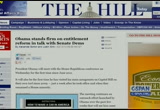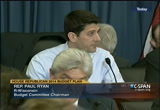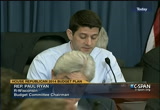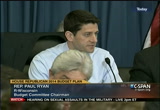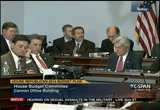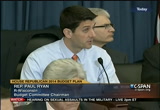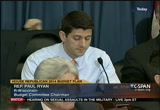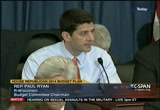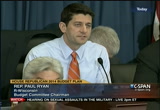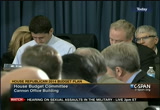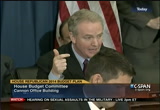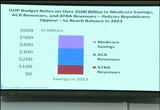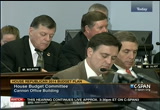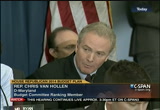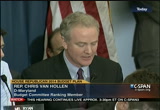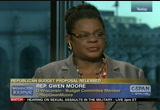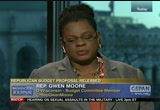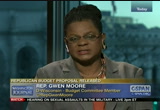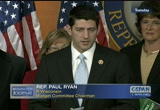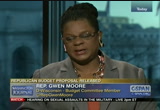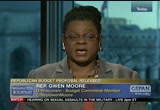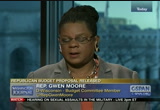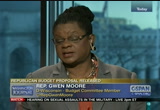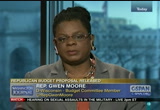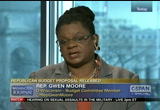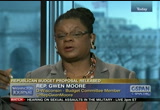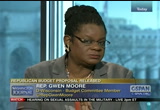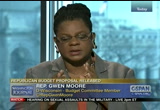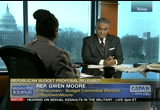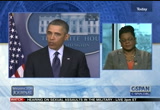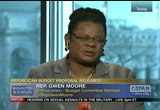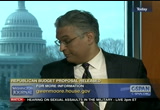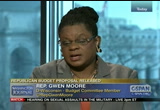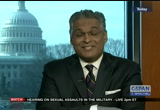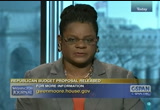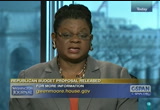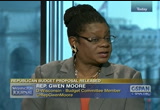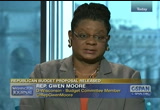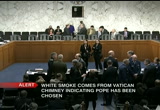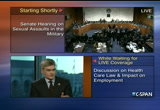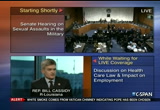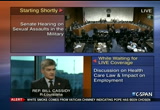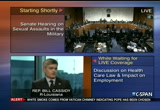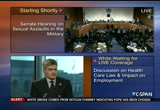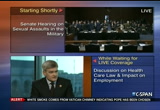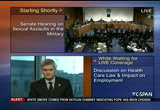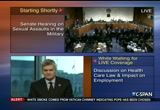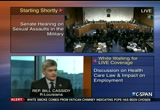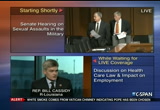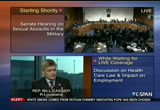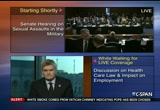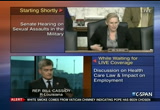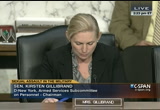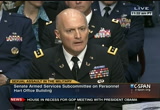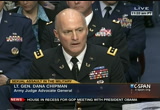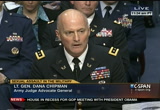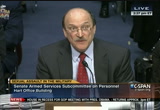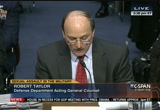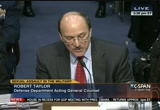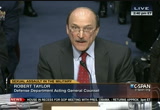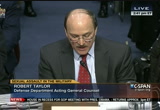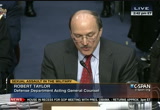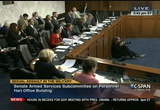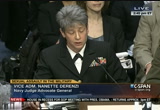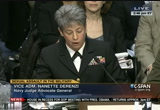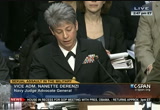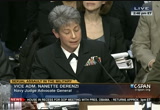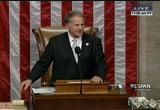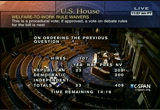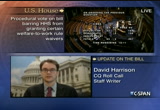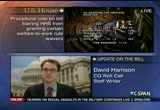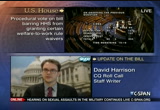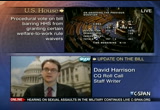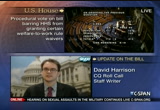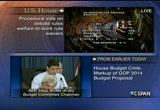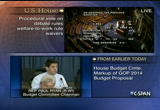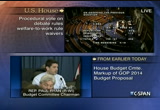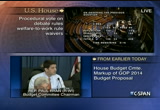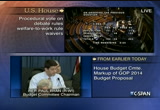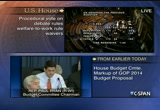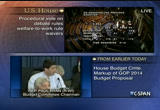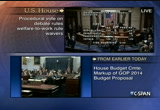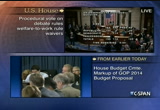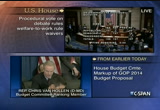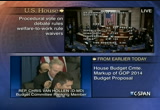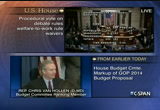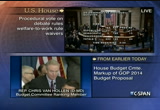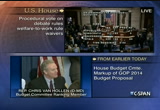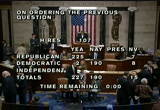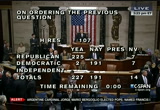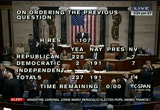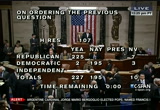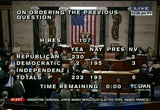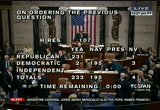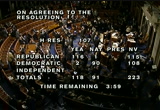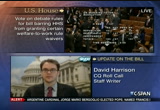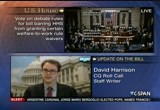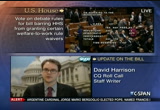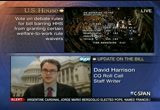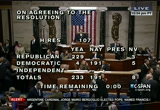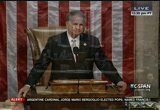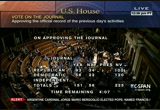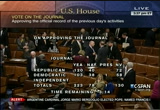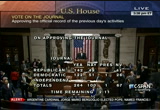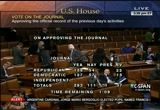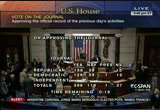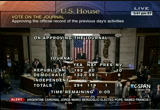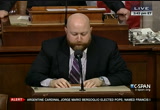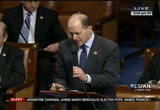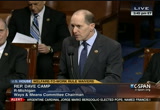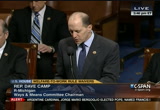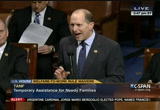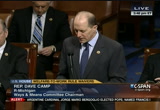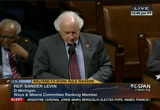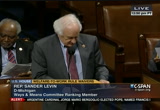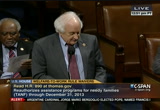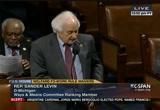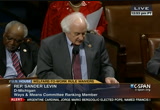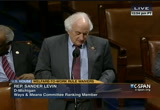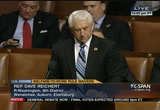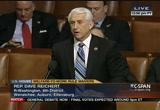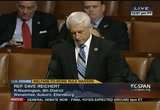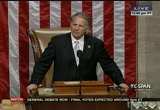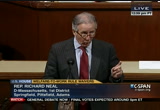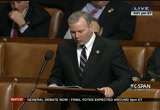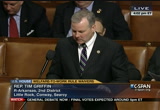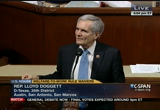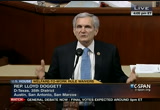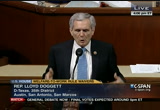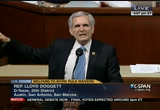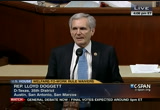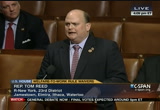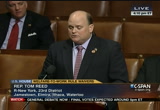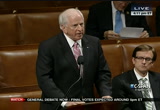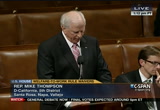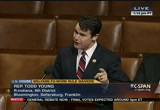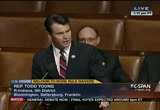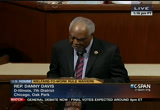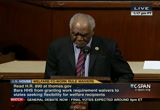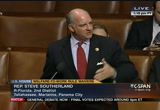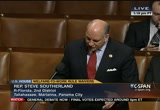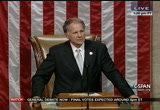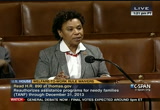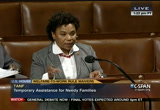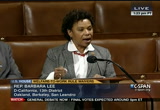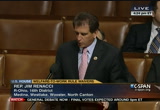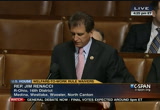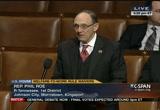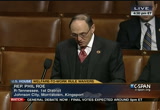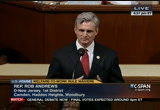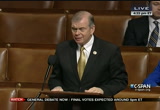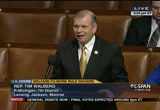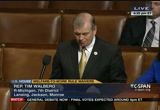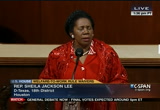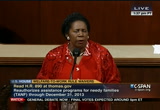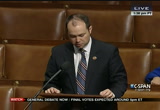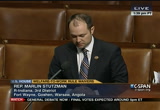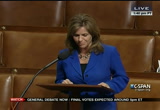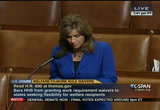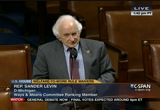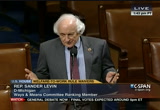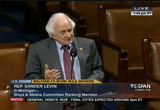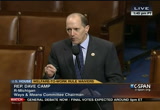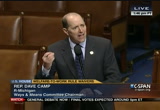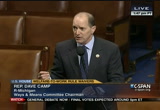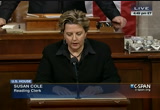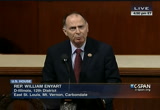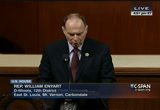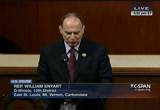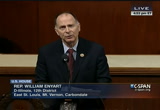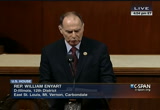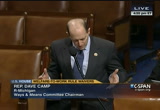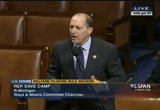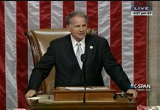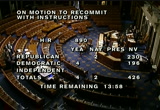tv Public Affairs CSPAN March 13, 2013 1:00pm-5:00pm EDT
1:00 pm
we saw yesterday that the house budget committee chairman was pressed on this issue and it was a tricky moment for him in the press conference. he included some of the tax increases that have gone into effect in recent years and explain how he was also kind of get rid and explain how he would also kind of get rid of the president's format. this is something that democrats are saying, well, week of been through the supreme court challenge, you voted on it, something like 30 times. why are we continuing to battle over something that we have no
1:01 pm
intention of fulfilling. >> the president scheduled to do his budget the week of april 8. the senate going to meet with house republicans today. give us the nature of these meetings and what will happen. >> today is the second of four trips up to capitol hill for president obama. it's part of this consensus where he's trying to win over congressional support for a grand budget bargain. this has been an effort that was kind of served by failing to avert the squeft a couple of weeks ago. he's got almost the opposite challenge of what he did yesterday when he met with senate democrats, when he was meeting with senate democrats yesterday they were pressing him on his kind of willingness to accept social security cuts and changes to medicare,
1:02 pm
entitlement programs. democrats are very much in opposition to that. today he's going to go face house republicans who as we know are very much in opposition to any increase in tax revenue. and so while yesterday he was kind of trying to win over democrats for a deal that would , you know, potentially touch entitlement programs, today he's going to say -- face kind of a hostile republican cawculls. this is the first visit to republican conference on capitol hill since 2009. obviously he's being an tig nist for house republicans and this is going to be a tough sell for him. host: are there any details in terms of the details of the meeting itself, how long it will last, what the format will be, what the agenda is? guest: we expect it will probably be similar to yesterday where the president will come for a lunch, he'll be there for about an hour and a half, have some remarks at the top and then take questions from house republicans. so, you know, that back and
1:03 pm
forth is an opportunity to certainly exchange ideas but also an opportunity for, you know, some house republicans to vent some of their frustrationses with the white house. . guest: no vision, they support a package that includes nearly $1 trillion in new tax i creases -- increases, but basic tax sort of used by the whole entitlement programs that the poor and elderly have come to to count on in a way that the ryan budget would dramatically cut. host: with the hill serving as staff writer. the story he has today talks about the meeting with senate democrats and also talking about the meeting with house republicans scheduled today at 1:30, mr. sink, thanks for your time. guest: thanks for having me. >> again, president obama back on capitol hill today talking about budget and deficit issues
1:04 pm
with congress. earlier this week house budget committee chairman paul ryan submitted his 2014 budget proposal. that legislation is being considered marked up by his committees. under way this afternoon. follow that on c-span3. senate budget committee is under way as well and we are covering that, too. here's a look at the opening statements from this morning's house meeting. >> as you know writing a budget is a tough job. because you have to make choices. everybody pitched in this year. and i am grateful for the help of our members of the committee. we sat around a table for a number of weeks just like families and businesses do assembling a balanced budget. i'm also grateful for each member, chris van hollen, this committee has a long tradition of bipartisan cooperation which he and his staff have continued. we have a good working relationship even though we have very, very spirited debate on the issues that we don't agree on. i know we'll have spirited debate in the hours ahead, but we will hold these debates in the spirit of good will that has
1:05 pm
defined this committee for a long time. and we should. because you know what? we owe it to the country. after years of trillion dollar deficits, we owe the american people a responsible balanced budget. and for the third year in a row we in this committee will be delivering it. this time our plan balances the budget in just 10 years without raising taxes. how do we do it? we stop spending money we don't have. historically we have paid a little less than 1/5 of our income in taxes to the federal government each and every year, but the government has spent much more. so we match spending with income. we spend no more than we take in each year, as a result we smend $4.6 trillion less over the next 10 years. every family needs to live within a budget. we think the federal government should do the same as well. it's a reasonable goal. just look where we are. and look where we are going. today our national debt is
1:06 pm
bigger than our entire economy. unless we change course, we will add another $9 trillion over the next 10 years to our national debt. that debt will weigh down our country and our economy like an anchor. at some point lenders will lose confidence in us. they will demand higher interest rates. when they do interest rates across the country will skyrocket on credit cards, mortgages, car loans, families. as interest rates rise, debt payments will overwhelm all other items in the budget. and the debt will overwhelm the economy. our finances will collapse. the safety net will unravel. the most vulnerable, that's who suffers the most under a debt crisis. a debt crisis would be the most predictable disaster in our history. i looked back at 2008 like it was yesterday sometimes. i remember seeing all that was hatching in front of our eyes. i remember panicked meetings with the federal reserve chairman and treasury secretary, and looking back we can see what
1:07 pm
happened, but at the moment it was a crisis that hit us by surprise. look what happened in the meantime. look at the trillions of dollars of wealth lost. trillions of debt added. millions left without work. look at the payrolls that have gone empty. lives that have been displaced. that caught us by surprise. this coming debt crisis, the most predictable crisis we ever had. we see it coming. we know what it will do. we have a moral obligation to prevent it from happening in the first place. by 2023, we will collect twice as much revenue as we did last year. but c.b.o. said the deficit will be nearly $1 trillion that year. clearly spending is the problem. and it's more than an economic problem. by living beyond our means, we are stealing from our children. it's selfish. it's immoral. it's wrong. it's unfair. and it has to stop. so we not only balance the budget in 10 years, by putting the right reforms in place, we also pay down our debt.
1:08 pm
the less we owe to foreign creditors, the more of our own future we will control. the truth is our debt is a sign of overreach. it's a sign government is doing too much. and when government does too much, it doesn't do anything well. so it's only common sense to balance the budget because it returns government to its proper limit and it's proper focus. we believe that there is an important role for the federal government and we want those roles to be respectful of its limits, and we want the government to do its functions well. when the government does too much, when it tries to do everything, it spreads itself too thin, it doesn't do anything very well. by balancing the budget in 10 years, we will promote a healthier economy and help create jobs. c.b.o. says that legislation that reduces the deficit as much as our budget would increase gross national product by 1.7% by 2013. an economist said that reducing
1:09 pm
the deficit now would have immediate positive effects for growth and jobs. our budget will provide economic security for families. it will guarantee a secure retirement for seniors. it will expand opportunity for the young. and look what they are reaching. escalating student loans, bad economy, no chance of getting good paying job to pay those loans back. they deserve better than this. this budget will restore fair play to the marketplace. we want to get out of the business of cronyism which both parties have fell victim too, picking winners and losers in washington. we want fair play for everybody in the marketplace. it will keep our country safe. as part of our plan we cut wasteful spending. i know some of my friends on the other side will object, but let's try to put this in perspective. on the current path we will spend $46 trillion over the next 10 years. under our proposal we will spend $41 trillion over the next 10 years. on our current path, we will be increasing spending by an
1:10 pm
average of 5% each and every year. under our proposal we will increase spending by an average of 3.4% each and every year under this budget. because the economy will grow faster than spending, the budget will balance by 2023 and the debt held by the public will drop to just over half the size of our economy. a far more manageable level and a path to get this debt paid off. but the most important question isn't how we balance the budget, it's why we balance the budget. a budget is nothing more than a means to an end. and the end is not a neat and tidy spread sheet. it's not simply a green eyeshade accounting exercise. it's the well-being of our people. i don't look at this issue like an accountant, i look at it as a citizen, husband, dad. it's not fair to take more from hardworking families to spend more in washington. it's not fair to let critical programs like medicare fall
1:11 pm
apart. i want medicare to be there for my kids just like it's there for my mom today. but medicare's going broke. and if we want to keep our promises, we have to strengthen this program. i understand that not everyone shares our view. and i respect that difference of opinion. but all i ask is that you join in the effort. if you don't like our plan, offer your own. we may not agree on how to balance the budget, but we ought to be able to agree on the need to balance the budget. a balanced budget's a reasonable goal. it's one we should share. a balanced plan that never balances is not balanced. so i look forward to our discussion today. and i look forward to the debates ahead. so when we hear the word balance being thrown around about how approaches are balanced, it's more spending fueled by higher taxes that never balances, that does not do justice to the next generation. it does not do justice o our economy. it's unfair to the people who
1:12 pm
are depending on these critical safety net programs. with that i want to yield to the ranking member, mr. van hollen, for his opening statement. >> thank you, mr. chairman. again i want to thank all the members of the committee as we gather here and what is a very important moment for our country. thanks to the ingenuity and resilience of the american people and the emergencies actions taken by the president and the congress four years ago, we are continuing to recover from the worst recession since the great depression. momentum in the job market continues to grow, but we still have a long way to go to help put people back to work, to accelerate economic growth, and to boost small business hiring. yes, we must and can steadily reduce our deficits and reduce and stabilize the debt. but we should do that in a way that immediately reduces the jobs deficit rather than a budget that immediately makes that job deficit work.
1:13 pm
unfortunately this republican budget fails that very simple test. the nonpartisan, independent, congressional budget office has shown that the approach taken in this budget will result in 750,000 fewer american jobs just by the end of this calendar year. it will reduce economic growth this calendar year by 18/3. we cannot afford to do that. an analysis yesterday by the economic policy institute estimates that next year, 2014, it will cost us two million jobs. so the issue is not whether we should steadily reduce our long-term deficits, but how we do it. we believe that our budgets should be blueprints for economic growth that lead to greater upward mobility, rising middle class wages, and shared prosperity. we believe we should share responsibility for reducing the deficit rather than providing
1:14 pm
tax breaks for the very wealthy while balancing the budget on the backs of the middle class, on the backs of our kids' education, and by violating our commitments to seniors. this republican budget once again takes an ideological, uncompromising approach to addressing that budget challenge. mr. chairman, last year we were told that the presidential election was going to give the american people the opportunity to choose between two fundamentally different approaches to this challenge. one lopsided, one balanced. they voted and they chose to reject the lopsided approach reflected in this budget. the american people rejected the idea that we will give additional tax cuts to the wealthiest americans at the expense of middle class taxpayers, at the expense of important commitments to our seniors, at the expense of vital investments in our kids' educations, in breakthrough and scientific research, and the infrastructure that helps provide the hard wiring for our
1:15 pm
economy. investments that have helped make the united states a world economic powerhouse. so let's take these one at a time. simple math shows that this budget will finance large tax cuts for the wealthiest by raising the tax burden on middle class taxpayers. the budget calls for dropping the top tax rate from 39% to 25% , cutting the rate for millionaires by more than 1/3 while holding all other revenues constant. just last fall the nonpartisan tax policy center did an analysis of a far more modest plan put forward by governor romney to reduce the top tax rate from 35% to 28%. and they showed it would inevitably raise the income tax burden on individuals making under $200,000 a year. this budget proposal which provides even bigger tax cuts to millionaires will raise the tax burden on middle income families by an average of $2,000.
1:16 pm
at the same time, same time it does not close one single special interest tax loophole for the purpose of reducing the deficit. not one dime from ending special breaks for corporate jets, big oil companies, or hedge fund managers to help us reduce the deficit. while providing this windfall to the very healthy, this proposal guts vital investments that are essential to shared prosperity, upward mobility, and to rising middle class wages. it protects pentagon spending, but it more than doubles the already deep sequester cut to nondefense discretionary. takes it down to the sequester and then doubles them. those will the -- those are the funds that will provide the seed for important investments that help our economy grow. and short changing that will result in national decline in important investments that have helped us in the past. this plan also proshall-violates
1:17 pm
our commitment to seniors in a number ways. it reopens the drug doughnut hole. immediately beginning to pile large additional bills on to seniors with high prescription drug costs. it takes a wrecking ball to medicaid, slashing it by $810 billion over 10 years. remember 2/3 of those funds go to seniors and individuals with disabilities. finally, for everyone under 55 who has been paying all their life in the medicare insurance, they will now receive a voucher premium support, call it what you want, that declines in value relative to rising health care costs, leaving them to eat the difference. finally, let's look at how this budget hits its political target of balance in 10 years. first, it uses all the revenues generated by the new higher tax rates on individuals with incomes over $400,000 a year. a measure that was opposed by
1:18 pm
the overwhelming majority of house republicans. it is ironic that after hearing from so many years in this committee that new revenue couldn't make a measurable difference in reducing our deficit, that that revenue is essential to bringing this to the political target of balance in 10 years. even more interesting is is this budget would not balance without obamacare. it is simply wrong to say that this budget both balances in 10 years and repeals obamacare. now, this budget does eliminate the important benefits and patient protections in obamacare. it will eliminate the provisions that prohibit insurance companies from denying insurance coverage based on pre-existing conditions. it will limit the benefits, tax credits for people to afford a health care in the exchanges. it will eliminate the tax credits for small businesses. it eliminates all that, but it keeps the rest.
1:19 pm
it keeps all the parts the congressional budget office said showed reduced the deficit. remember the $716 billion in medicare savings that we achieved in the affordable care act by ending overpayments to private insurance companies and by modernizing the system without reducing benefits? remember that? we were told last fall that those savings would result in hospitals shutting down, in nursing homes shutting down, and a whole parade of other horrible consequences. those scare tactics were not true then and they are not true today. that's why all those savings are included in this budget before us today. and remember on the tax revenues in obamacare, those on higher income individuals, those on industries that will benefit from the fact that obamacare will expand coverage and those penalties from the people who will try and freeload on the system? all those taxes and revenues are
1:20 pm
included in this republican budget. in fact, the dirty little secret is this budget would in the balance if not for the medicare savings and all the revenues in obamacare. look at this chart up here. in the 10th year when it claims to hit balance, $400 billion of that is from obamacare. and another $100 billion of that is from the tax revenues. so half a trillion dollars of how this budget achieves balance in 2023 is from obamacare. i want to finally point out one very serious consequence of trying to have it both ways with obamacare and this budget. by eliminating the obamacare benefits while retaining the savings and the revenue, you will severely undermine the health care system. many hospitals, providers will
1:21 pm
go belly up under that budget prescription. that's because your budget reduces reimbursements to those providers while eliminating the provisions of obamacare that provide them with 27 million more insured patients who will be able to pay for their care. that formula, taking what you want and discarding what you don't, is a kay -- recipe for chaos in the health care system. mr. chairman, the election is over, the american people rejected the uncompromising approach taken in this budget. next week we democrats in the house will present an alternative budget we believe meets those priorities in a balanced way. i do hope as we move through this budget process over the next months, we are all willing to make the hard choices necessary to reach balanced agreement that is good for the country, one that does accelerate economic growth now and in the future and lay a strong foundation for rising wages, upward mobility, and
1:22 pm
shared prosperity. america online from this morning the opening statements at the house budget committee markup of the fiscal 2014 budget proposal released yesterday by ball ryan, the chairman of the budget committee. the budget committee expected to gavel back in about 3:30 eastern this afternoon to continue that markup. we'll have live coverage of that on our companion network, c-span3, about 3:30 or so. also let you know the senate budget committee will begin their deliberations today with opening statements and that's expected to start around 2:00 or so eastern and that will also be on c-span3. those budgets both the senate and the house budget released yesterday. majority leader reid on the floor of the senate gave his thoughts on the paul ryan budget for 2014. >> last night i you -- i filed closure in order to proceed to this important legislation. we are in the mirts-r midst of
1:23 pm
another gibble. if know agreement is reached the cloture will be tomorrow more. americans got a first look at this year's ryan republican budget. turns out it looks like last year's ryan republican budget. i looked at anyone that said, gee whiz, not again? here's the headline from bloomberg news. quote, ryan budget replays republican hits, close quote. another "washington post" reporter compared the release of the not so new, and certainly not improved ryan republican budget to the movie "groundhog day" where bill hurry relives his least favorite holiday over and over and over. remember, this is the third ryan republican budget. this is what "the washington post" also wrote, quote, the reprisal of the same fiscal vision that was decisively
1:24 pm
reputed last fall is bound to attract notice. close quote. this is the same budget plan we saw from congressman ryan last year and the year before that. even the name is the same. if anything this new version is even more extreme than the last two ryan republican budget proposals. proposals that sought to end medicare guarantee and raise tax on middle class families, all while handing out more tax breaks to the wealthy. the ryan republican budget is anything but balanced. and it reflects the same backward value americans rejected in november. instead of asking the wealthiest to contribute theiraire share, the ryan republican budget demands middle class families pay more in taxes. instead of ending wasteful corporate tax loopholes, it basically ends medicare. in fact, the ryan republican budget takes special aim at
1:25 pm
health care. it will eliminate preventive health care services for 34 million americans. the ryan republican budget would increase prescription drug prices for seniors by $2.5 billion in one year. it will end the coverage guarantees for 3.1 million young men and women on their parents' health plans. the budget would end coverage for mammograms, cervical cancer screenings, and contraception for more than 47 million women. and it would allow insurance companies to deny care for 17 million children simply because they were born with a heart defect or some other illness. these drastic cuts will literally cost lives. and also jobs. instead of a balanced approach that protects the american economy, the ryan republican budget guts education and medical research, infrastructure, and even public safety.
1:26 pm
the ryan republican budget would actually jeopardize the economic recovery, it wouldn't help it. and the huge and painful cuts combine an awful lot of debt reduction, think again. instepped congressman ryan's cuts will buy more tax breaks for the wealthiest among us. this budget isn't to reduce the deficit. meaningful deficit reduction will require shared sacrifice. contributions from those who best can afford to contribute. today budget chairman patty murray will introduce a budget that reflects the principle of balance. senator murray's plan, democratic plan, will cut wasteful spending, reducing the deficit, and close tack loopholes that benefit the rich. it will invest this things that help our economy grow. education, preventive health care, worker training, roads, and bridges. it will invest in a strong middle class and unlike the ryan republican plan, it won't leave
1:27 pm
you wondering it's groundhog day all over again. >> the majority leader from yesterday. again the 2014 budget discussions continue. follow that on c-span3 with the senate and the house markup. the 2013 discussions on the continuing resolution, that's on the senate floor on c-span2. here on c-span in about a half our owe so we'll take you live to a senate subcommittee hearing looking at sexual assault in the military. they'll hear testimony from military legal officials and until then we'll bring you a conversation from this morning's "washington journal," back to the subject of the 2014 budget. host: joining us now, representative gwen moore, women from wisconsin, member of the budget committee. give your assessment of the release of yesterday's budget. guest: i can tell you it sort of double downed what we have seen during the last campaign and of
1:28 pm
course the last two budgets that chairman ryan has proposed. the thick thing that i think is really -- thing that i think is disappointing is the policy statement of principles. it sets up children, the elderly, the middle class, kids who need a college education as the straw man that you have to tear down in order to justify these draconian cuts that are made. it's a statement that nothing counts except for budget deficit . while there is some -- there is an illusion that there is some growth, there is not one bit of investment in research, development, education. it cuts back on any of research
1:29 pm
and development. it's a no growth policy statement. matter of fact economists see it as reducing the g.d.p. by 1.7% instead of the projected 4% growth that we are on the path to right now. and it's disappointing. what i will say because i do like my chairman, paul ryan, is that he has stated really explicitly that he sees this as his firmest offer so that if they go into a conference committee he can work and negotiate from that point. sure there is a lot of negotiating that will have to be done with this bill. host: where do you start? guest: i think that when you look at the senate democrats' proposal, there is $100 billion in investment. i think we need a job growth package.
1:30 pm
by no means wild-eyed liberals like chairman bernanke, not all alternatives are the same. so the senate democrats for example have $100 billion in infrastructure investment. that will create jobs, spawn economic activity, it helps everybody. the candlestick maker, roads builder, the diner on the side of the road where workers eat. suppliers, developers, there's got to be some growth because the ryan budget it's projected there will be two million jobs lost in this budget. i think that's a real important negotiating point. chairman ryan talks about continuing the medicare voucher plan, for example, i think that there could be some negotiateation really around
1:31 pm
reducing the cost -- negotiation really around the cost of medicare. i think of all the entitlement programs, there is a real opportunity to do that. host: even when the president suggests these kinds of things looking at entitlement programs, you are ok with that on its face? guest: i really looked at this hard and long and i think the affordable care act has shown us in the analyses we have done, the affordable care act which of course chairman ryan repeals in his budget, and creates further huge deficit, but the affordable care act has shown us how we can bend the cost curve, focusing more on quality as opposed to quantity. if you have a loved one who has been in the hospital lately, you may have noticed when the nurse comes in to hang an i.v., before she hangs it she scans it, there is a bar code on it. then you are charged for that i.v. bag. they put a band-aid on you
1:32 pm
that's scanned. that's no way to deliver health care services. if you come in with cancer or with diabetes, you need to be treated like a whole person. host: our guest is going to be with us as we talk about the release of the budget. she's representative gwen moore of wisconsin and of the house budget committee. here's your chance to ask her questions. 202-585-3880 for democrats. 202-5 5-3881 for republicans. 202-585-3882 for independents. your chairman yesterday talked about particularly what he wanted to do to the affordable care act as part of this budget. i want you to listen to it and get your response. >> we believe that obamacare is going to be so unpopular in this country because of all the broken promise that is it will prove. remember when the president said if you like your health care plan you can keep it? americans are going to have a rude awakening and find out that's not the case. remember if the president said if we passed obamacare it would
1:33 pm
lower health care prices and costs? it's been going up. remember when he said would he do it out in the open? it's backroom deal. look at all the things the provider will experience with obamacare, are you going to see substandard health care. you are going to see young people not wanting to go into the field of health care because of obamacare. we believe that in the interest of health care for seniors and interest of health care for families, in the interest of making medicaid work better for low-income people, we need to repeal and replace obamacare with a better system, a patient centered system. host: representative moore. guest: i think chairman ryan is very eloquent and -- but i have to point out the oxymoron that he talks about. here we are going to save medicare. we are going to save medicare and provide higher quality of medicare services by doing what? by providing a voucher?
1:34 pm
premium support where people go into the marketplace and they choose -- as he says they choose their health care. the only way you have a choice is if you have a substantial amount of money to subsidize the voucher. if you are a senior fortunate enough to have $6,000, $7,000 a year extra to apply to your voucher, maybe you get a decent health care coverage. but if you are a middle class person, a person who has worked every day in their lives and paid your premium for medicare, you'd find yourself -- depending on the cost of health care and how fast it rises, we know that it's increasing 10, 15% every decade, you are going to find yourself falling further and further and further behind. he says you have a choice of going into traditional medicare. now that is the program that
1:35 pm
would give you the lowest quality of care. would you have a two-tiered system. wealthier medicare recipients would have one health care coverage. and lower income americans would have another one. host: the house budget committee sits down to talk about this budget. what happens and what are questions are you going to bring to the chairman? guest: i am going to hold the chairman accountable for the statements that he has made. he says, for example, that he wants to balance the budget. certainly this budget does that, but in addition to that he says that it's going to be a growth budget. how do you grow a budget when you take pell grants away from young people? how do you grow a budget when you strip out all the rail and infrastructure improvements that the president has? how do you grow a budget with no research and development in our budget? how do we become -- how do we have our hegemony in the world with creating new inknow
1:36 pm
veterans day vation, -- invasion w. a budget that's stripped down everything in the way of invasion. how do you enjoy the peace dividends by plusing up defense but cutting everything else down? he says he wants to improve the safety net for people and that he wants to end the culture of dependency. i want to challenge him on who he is talking about. he wants those lazy six-month-old kids to get up off of their dusty crusties and get themselves some formula? or is he talking about the elderly who are on medicaid? he says medicaid is a welfare program. and that he doesn't want the safety net to become a hammock. well, are we going to ask an 85-year-old woman who is in a nursing home, worked her entire life, spent down all her resources, she's a widower, her husband's resource, sold her
1:37 pm
house, finds herself still alive at 85, that's who is using medicaid not some taker. how do we talk about -- our 18 and 19-year-olds in college who need pell grants. are these the people who are dependent? or the 50 million people who find themselves on food stamps because of the recession. we know that food stamps usage increased because of the recession. and so these are the straw men i'm going to challenge him on. host: our first call is joe from delaware, ohio. republican line. joe, go ahead. guest: hi, joe. caller: good morning to you both. my point was this, wait i see it was the republicans already ponied up the tax increase, punitive or not, most of us knew it wouldn't make a debt in the deficit, but nonetheless it was
1:38 pm
done. and now here we sit and it's time to be, as is said, fair and to compromise. we have already ponied up quite a bit although as i said earlier not enough to put a dent in anything but did it nonetheless. now it appears -- now you want fairness. now let's both give. i'm like, whoa, whoa, whoa. we already did give. when is it that you guys give? we already offered to close tax loopholes and boehner did, and you guys pooh-poohed that a long time ago and you wanted your tax increase from the rich and you got it. now you're back saying let's see about those loopholes, let's talk about them, let abfair. let's be fair? when is it you are going phony up? guest: joe, i think you have asked a very important question. it's true that we got about $600 billion, not as much as i wanted quite frankly, from the fiscal cliff deal, but we have cut $2.5
1:39 pm
trillion in spending. you do the math there. $600 billion is a lot less than $2.5 trillion in spending. there's -- when you talk about a balanced approach, you talk about evan--- even-steven deal. when you talk about closing tax lope holes, there are many opportunities to do that. for example the buffet rule that they are talking about in the united states senate. named after warren buffett who said, gee, here i am a billionaire and my secretary pays more in taxes than i do. simply saying if you've got net after paying all your expenses, everything, if you've got an income over $2 million, you should have an effective tax rate of at least 30%. of course the ryan budget here
1:40 pm
doesn't do anything about the oil and gas subsidies that we could close. i think it's important to put investments in areas where we need investment. why not shift those tax credits and benefits to a new energy economy? building a good grid. creating jobs by doing it, by incentivizing business. yes, let's work with business, but incentivizing these companies to do something that will not only create jobs and opportunities for folks. so i do get your point that you ponied up $600 billion. it's a sacrifice for people who are -- 1%, small 1% in our country, but there have been $2.5 trillion taken out of the economy. you look at somebody like chairman bernanke, he says that one policy option is not equal
1:41 pm
to another. so if we slash and burn and cut unemployment insurance, for example, as a way of cutting the budget, that that has a dill tearous impact on our -- dilatorious impact on our income versus taking a few more dollars from the wealthiest people. host: brooklyn, new york, alice on the democrats line, hello. caller: thank you. i'd like to say, paul ryan before, i don't -- don't hang up i want to be able to say he sounds like he was running still for vice president. he lost. he's a congressman. that's number one. number two, why hasn't these republicans who each time seem to think that this is so
1:42 pm
outrageous why we should get health care, let them give up their health care. let them give up the dental that nobody has. it used to be a time when congress fought for whatever they got, people that worked out in the rest of america also got, and what's happened is now it's lopsided. i think congress, especially the republican women who voted against women getting equal pay, yet they get equal pay. host: he we'll let our guest respond. guest: thank you for your call. i can tell that you chairman ryan has really stated just because he lost as vice president doesn't mean he's going to give up all his principles. that's his explanation for why he is introducing the same legislation.
1:43 pm
and he holds them out as principles. principles that we are spending too much money and that the total solution to our economic problem, let's just cut spending and that somehow the economy will grow from simply just cutting. if you want to use the analogy of a family that they so often want to use, you don't say i'm going to pay my mortgage off today instead of the 30-year arrangement that i have, and i'm going to pay my car note off today, and in the meantime we just won't eat for the next 30 years or we -- that's not sensical. and i think responsible economists have said that. with regard to health care 70% of the cuts that representative ryan makes in this budget are on health care. and women are much more
1:44 pm
dependent on health care than men. women are much more likely to be dependent on their husbands for health care. women are likely to live longer and need medicaid so that they can have an end of life experience that is of some quality. and you're absolutely right. it's just attacking health care. it attacks where women are most vulnerable. host: cheyenne wyoming, independent line. guest: hi, dennis. caller: i have a couple questions for you. give a little background. retired military, 21 years-plus service, i am now 63 -- 64 years old and retired. and starting to enjoy my life. i got a letter the other day that says due to budget cuts probably, my tricare prime was going to be dropped and didn't if i live within 40 miles of a
1:45 pm
military base i wouldn't have medical care like i had before. it's looking like approximately six times more than i pay, presently pay is going to cost for health insurance. 21 years, serving my country, putting my life on the line, and now i'm being kicked out of a federal medical service that was not a written guarantee but a verbal guarantee when i joined the military. and i'm looking at you folks sitting in congress getting all this med care care and everything -- medical care and everything. let's put everybody under the affordable health care act, make everybody equal, and make it fair for everyone. your service is in d.c. which could be a war zone but it was no more than me or my fellow veterans did for this country and now being thrown aside. guest: dennis, thank you so much for your service. one of the things that was most
1:46 pm
shocking to me when i started delving into the budget to realize that the department of veterans affairs and the defense budget were two separate entities. while we see congressman ryan trying to plus up defense, that has nothing at all to do with people who already served. it's fine and good to add billions more dollars to the weapons of war and the -- war theater, but then once you served, we are just sort of done with you. and you just go and live with the consequences ever your health care coverage or your disabilities that you developed. this is a major, major flaw in how we put forward polcy. people don't realize that -- policy. people don't realize that when they hear we are cutting defense spending, they think that we are
1:47 pm
plusing up defense spending we are plusing up veterans care, but we are not. host: front page of the "wall street journal" has a look at the defense spending. the budget calls for $560.2 billion in 2014. that's roughly $100 billion less than the 4% formula over 10 years. he would spend at least 2 $2.3 trillion less than either he or mr. romney advocated. guest: he's claiming the same defense, peace dividend that the president had. i think that's one of the things that's wrong with his budget. on one hand he claims the savings that the president is enjoying, and then claiming that he's reducing the deficit. he actually pluses up defense. with the savings. host: chris from michigan for our guest. on the republican line, good
1:48 pm
morning. caller: good morning. guest: good morning. caller: i'm a -- no, definitely not a democrat. i'm a heavy republican. i have a problem with the democrats. i live in michigan and heavily unionized, unfortunately unionized state, and thank god we became a right to work state. but the thing i have is when you made the statement that says you have $600 billion in taxes and you wanted more, first of all you guys have a spending problem bye you guys don't admit -- which you guys don't admit. the president of the united states is a very unionized person and you guys talk about special interest, he always helps out the unions with -- like when you say education, before you reform education, all that money goes to the union
1:49 pm
teachers, the teachers ubeon ruined the public schools. my daughter-dirnl' not wealthy in any means, but my daughter goes to a private school because the unions have ruined especially my state by what you guys have as a spending problem, all you want to do is tax and spend. and you have so many duplicate programs that you could eliminate that overlap. i heard senator tom coburn said there's so much waste. there's so much duplicate programs and departments that you can cut. guest: thank you. i want to -- i think unionization has really created the middle class. and not only for members who were unions, but people who were not in the union were able to benefit from that.
1:50 pm
i hail from wisconsin right across the lake from wisconsin. where afscme was born. where civil service was born. and so when the union negotiated things like the minimum wage, like 40-hour workweek that spilled out into the private sector. when we ended child labor. these were all accomplishments of the union movement. as we see -- what we are experiencing now is greater and greater and greater income inequality. because we are losing union membership. we are down to about only 6% of households are now union membership. that gives the opportunities for companies to get greater and greater and greater profits and they don't plow it back into the quality of life for people. and did helps the overall economy. 2/3 of our economy is consumer
1:51 pm
spending. so you live in michigan, i don't know if you said you lived near the car industry or anything, but what ford understood is he couldn't become wealthy as a car industrialist unless his employees could buy a car. if you don't pay people the minimum wage, you don't give people -- if you don't share in the wealth, then the economy won't grow. you talked about waste, fraud, and abuse, and i do agree with you on that, there are lots of ways we could cut waste, fraud, and abuse. of course the sequester is no way to do it. just taking a hatchet to the budget and cutting out without really looking at ways that we really could trim the budget and eliminate duplicative programs. thank you for your question. host: the president meets with you on thursday. what do you expect from the meetings? what do you think about the way he's been meeting with other
1:52 pm
republicans and parties when it comes to budget and spending issues? guest: i think the president can't win for losing. when he doesn't meet with people he's aused of being distant and aloof. when he does meet with us, then he's caving. i know people in my party become very paranoid and upset, he's eating with those terrible republicans. putting us on the menu. host: even senate democrats said they were concerned about entitlement programs and spending already. guest: exactly. i do think that the -- i certainly will be in attemptance thursday. it's always a privilege and pleasure to at least be heard. i think people want to be heard. so that whenever these decisions are made people can go back to their constituents and say, you know, i did or i didn't get what you wanted. i got this piece of what i wanted. and had to give that up. but at least i was heard.
1:53 pm
host: up until this point have you taken leadership on this issue? guest: i think he's taken tremendous leadership. i don't think people want to give the ed president credit because there's something so blind as he who will not see. and the president has made offers that i'm glad the republicans didn't take him up on. when he was offering up to change c.p.i. which was very controversial as you may know in both the senate and house democratic caucuses. host: that goes back to concerns that -- concerns of some democrats as far as what he's going to give when it deals to entitlements and things like that. guest: there are many areas of entitlements that can be changed. again i refer to medicare. that seems to be the main focus of the paul ryan budget. i think medicare, reshaping the expectations of that, he even calls it a medicare exchange. it seems like we could pull paul
1:54 pm
a little bit closer to what we are thinking with regards to medicare for all. i think there is tremendous opportunities to craft some things. it depends on whether or not people are going to be dug in. i do think that the republicans need to do a little bit more than we do. we do have the presidency and one house. our democracy was not designed for the minority to be like a brat and rave and rant and not -- until they can't have their way. when i look at the schedule of congress i realize the republicans are just trying to run the clock out on this president's term. you come in. you do three votes in a day. one is on approving the journal. the other is on a motion to adjourn. and the other is on some
1:55 pm
congratulating a basketball team. we are going to run out of post offices to name before we destroy the postal service. host: independent line, this is william. go ahead. keep i was just commenting on -- caller: i was just commenting on the baseline budget numbers you live. those are outlays and people truly do not understand that. further than this when the president -- if you look at him seriously look at him, it's hard to define him sometimes, i do think he feels like it's a socialist type of future he sees for the country. his bailouts go to unions. obamacare destroying the -- people are afraid to hire, especially young people. his touting of green energy so
1:56 pm
useless in many ways. and finally refusal on tax reform. it's just disheartening. i'm 62. i worked for the government. i know that you couldn't have the kind of health care that you could buy it across state lines, tort reform, serious way of looking at things as opposed to socializing everything. guest: i'll be 62 this year as well. we are baby boomers. there are 10,000 of us a day that are turning 65. and these proposals that representative ryan are making will have an impact on us. think about it. medicaid budget. block granting it. that means 30 million people will not be able to avail themselves of medicaid. i don't know what your financial situation is, william, but i mean should you be unfortunate
1:57 pm
enough in this case to live for 20 more years and you became frail and elderly at 82 and need a home health assistant to come in, medicaid may not be there for you. if you have exhausted all your savings or if we have major changes to social security, where your social security income deteriorates every month, or you say you work for the federal government. their proposal takes $90 billion out of federal government pension programs. i don't know what your financial situation is. i know we are both boomers. you don't want socialism, but i wouldn't want you to live in austere poverty. host: last call, two rivers, wisconsin. republican line. guest: guest: wisconsin. caller: good morning. gwen moore, i had a question and
1:58 pm
comment. the question is you brought up about the $2.5 trillion that the president is saving. i have heard this touted by you and other democrats, and i'm not ripping on democrats, but isn't it true it's actually $2.5 trillion over 10 years of proposed spending not baseline spending? guest: actually it's probably about $2.7 trillion. i understated it because of some of the interest. there have been actual cuts that have been made in these programs. the budget that we are looking at right now, all of them are proposals. but we made a fiscal cliff deal, we made -- in the budget control act, those were actual cuts. so here we are at the table again saying that the only thing we can do now is just to cut more and more and more spending. i know, you look at people like
1:59 pm
ben bernanke i mentioned earlier, no, you might be able to accuse me of being a wild-eyed liberal, but you can't say he is. and austerity is really something that we ought to be concerned about. we ought to handle reducing our deficit, yes, i agree with that, but we have to make plans for that. we have to reduce it in strategic ways that don't impair our ability to be innovative. don't impair our ability to provide basic needs to the elderly, to the very, very young and vulnerable. and to our young people who we need to make sure that they -- that they are able to keep pace with technological innovation. host: we have other calls. webster spring, west virginia, democrats line, hello. guest: hi, tim. caller: good morning, c-span. i just want everybody to kind of
2:00 pm
work together and get on with the senate and the house committee. there is americans all across the nation. i live in poverty. i'm from up by chicago. i was in elk hart, indiana. i worked in manufacturing and all across the united states, there are too many suits and ties walking around and the deal is obama's right. obama's got a vision for this nation and i'm a white guy. i have been in -- the thing of it is it deals with the budget committee and you being a person on the budget committee, we need to cut the foolish spending where the lobbyists just go ahead and do what they want to do and just keep blowing money. .
2:01 pm
guest: amen with regard to your comments. we all do want to work together. it is really embarrassing sometimes to be a member of congress to think that you're offering intelligent people, most of us have life experience working in the work world. many of us have degrees and advance degrees. we even have a rocket scientist in congress. we have physicians. it would seem to me that we ought to be able to come to some agreement. i think the thing that's most egregious to me is to see people obstructing. it sounds like me rearing my kids. people have oppositional positions. you know, you say one thing and they do the other just to be oppositional. and we do have that problem here. we have people who have been elected to congress who think that their whole purpose for coming here is to destroy
2:02 pm
government. they don't see the proper roles of government. they don't think government should have clean air, that we have clean water. they don't think government should be involved in helping produce the next generation of innovation. i want people to remember that the internet was created by government funding of innovation. you know, the building of the highways and the interstate highways and the roads and the, you know, intercontinental rail, all of this was done because of the cooperation of government with the private sector. and, you know, it is -- but there are people who are greedy, quite frankly, who say, hey, you know, i could save -- i could get billions of dollars in profits if i were allowed to pollute the air and pollute this river that flows right into the next village or town. and if i didn't have to listen
2:03 pm
to the e.p.a. telling me what to do. if i didn't have to follow certain safety guidelines, i could get away with making millions more. i think government has an appropriate role to protecting all of us, not just by sending our boys and girls to war, but protecting us from greed. host: before we let you go, i want to get your response to the head of the congressional black caucus, marcia fudge, who sent a letter to the president concerned about african-americans being part of this cabinet. i'm concerned you moved forward with the new cabinet appointments and none of them have been african-american. what do you make of the letter, first and foremost? guest: well, i can tell you as chair of the congressional black caucus, marcia fudge has a right to weigh in with her thoughts. there are many qualified african-americans out there, and i think the white house would be well advised to look
2:04 pm
at some of them. as a person who has been an employer of a handful of people throughout the duration of my career, it's always important to me to be to have a diverse staff. it has greater policy options, different opinions. but the bottom line is you do want the most qualified and experienced people to be in your shop. and so i would err on the side of allowing the president to go through that process and make sure people are in best position to serve him. host: gwen moore, a person who will sit down and talk about the budget. guest: until midnight tonight. starting in -- host: 10:30. guest: we'll be there right before midnight. host: watch it on c-span. representative moore, thank you for your time.
2:05 pm
>> congresswoman moore from this morning's program. a live look at capitol hill. the u.s. house gavel in about 3:00 or so for a vote on the rule to a bill that deals with state waivers to welfare to work rules. we'll have live coverage of the house when they come in. one of the reasons for the house being in recess is that president obama is meeting with house republicans. president obama arriving on capitol hill about 35 minutes ago. >> mr. president, what do you hope to gain? >> hi. how are you? >> so president obama meeting with the house republican conference at this hour. he will be back up on capitol hill tomorrow to wrap up his
2:06 pm
series of meetings, what some are calling with his charm offensive. he's meeting with senate republicans and democrats as well. here on c-span, ahead of our house coverage, we'll take you live in just a bit to a hearing on the senate side. the senate armed services subcommittee on personnel has been holding a hearing. started this morning and continues with the second half this afternoon that's looking at sexual assaults in the military. heard this morning from victims of sexual assault. and this afternoon, senators will hear from military and legal officials from the army, air force, navy and coast guard. and the hearing is delayed just a little bit as there's a vote under way on the senate floor, vote on an amendment to the continuing resolution. so that just got under way on the senate floor. this hearing should get under way once senators make their way to the hearing room. live coverage here on c-span.
2:08 pm
2:09 pm
that the catholic church has chosen a new pope. that's what we heard from the associated press. as soon as we know more we'll let you know. the budget committee, the house budget committee gaveling back in this afternoon at 3:30 to mark up the 2014 resolution. that will be on c-span3 and c-span.org. waiting for the start of this hearing to get under way. we'll go back to our conversation on the 2014 budget from this morning's "washington journal."
2:10 pm
host: representative bill cassidy, a member of the energy and commerce committee and welcome to you, sir. guest: hey, pedro. thank you for having me. host: representative cassidy, a couple of the op-eds when talked about the release of the budget yesterday talked about a variety of things. good, bad, unrealistic. particularly to the unrealistic part, what do you think when you hear that term? at least to yesterday's budget release? guest: i assume you mean the ryan budget? host: correct. guest: unrealistic, the repeal of obamacare? host: correct. guest: right now president obama, erskine bowles debt commission said strength was the unsteanl -- spending was the unsustainible driver of the
2:11 pm
debt. if you say, listen, we can't sustain this. this is the president's bipartisan commission that will say that. maybe he'll say in spite of that unsustainible debt we'll spend the money. that's unrealistic. if part of the national discussion people say, wait a second, this isn't unsustainible, according to the president's people, that would force a re-evaluation. host: that's part of the math of the budget, is it not? guest: it's part of the math of the budget. if you look at the medicaid expansion, there's a lot of room that could be scaled back. a lot of room for savings there. so we would hope it's not quite unrealistic as they would make it to be. host: doing this over 10 years, is that realistic as well? guest: if you mean over 10 years that's the common budget window and so that's the convention among people here in washington who establish budgets. c.b.o. scores it over 10 years. so whether it's realistic or not, that's how the accounting is done. host: so as far as from what you read so far from the budget and what we've seen, what do you make of it, what do you
2:12 pm
like, what are you concerned? guest: the president's bipartisan debt commission said we have an unsustainable debt. social security is going bankrupt. i'm a doctor. monday morning i will be treating patients in a safety net hospital. i understand the importance of the safety net programs being preserved. as of now benefits will decline for those currently on the program if nothing is done. what i like is that it addresses this, it's going to hopefully force a national conversation so they don't just play out by ininertia. host: what is being proposed for the safety net programs? guest: medicare, under the affordable care act takes $116 billion and spends it elsewhere. under the ryan budget that's $716 billion is put back into medicare. and so, sure, the savings are still sought but the savings are put back into the program which is currently scheduled to
2:13 pm
go bankrupt 15 years from now or something such as that. that will preserve the life of medicare as we know it now. that's a good thing. host: as far as the idea of it being in a voucher system? guest: so, yeah, that's the president's lingo. if you're speaking about the bipartisan plan to save medicare which was originally conceived of by democrat senator brogh, and senator kerry which now senator wyden and paul ryan co-endorsed, a premium support plan much like medicare part d or what the president demagogues, that's a good plan. that's a plan that preserves seniors' choice and preserves medicare as opposed to just letting it go bankrupt. by the way -- and part of that plan would allow someone to opt for traditional medicare. so the president demagogues it by calling it a voucher program. but then you should also call
2:14 pm
medicare part d a voucher, because it's pat earned. host: our guest joining us until 8:30. if you want to ask him questions, you can do so one of three lines this morning. if you want to give us a call it's 202-585-3880 for democrats. 202-585-3881 for republicans. and 0 -585-3882 for independents. you can send us a tweet at cspanwj and send us an email at c-span.org. what do you look forward to hearing from the president today? guest: he's coming to speak to house republicans. i think he's obviously doing so-called charm offensive. cynically i would say he looked at polls and thinks the american people have been too partisan. that's hope he's coming up with something that is beginning to address the fact that medicare is going bankrupt and that his programs arguably make it worse and that we got to do something to sustain it. to address that, we'll take a
2:15 pm
bipartisan effort. so i'd like to think thatess he' sincere in coming that will preserve these programs as republicans have been advocating for as opposed to letting them go bankrupt. host: what would you ask him? guest: what would i ask him personally? host: if you have a chance to talk about it during the meeting today. guest: mr. president, your own bipartisan debt commission has said that our present deficit is unsustainable and these important safety net programs under your plans are going bankrupt. not rhetoric, not something for the press or the state of the union, what actual plans do you preserve to -- plan to preserve and strengthen medicare? i'm aware of the importance of these programs. if we let them collapse, they will be ill-served and society will be ill-served. host: tell us a little bit
2:16 pm
about the details of the meeting? how do they work? guest: frankly, pedro, you probably know just as much as me. we will come in 15 minutes early so the secret service will look at us. he'll sweep in and take questions. standard format. host: how long is the meeting? guest: about an hour. host: our guest with us to talk about topics related to the budget representative bill cassidy, republican from louisiana, member of the energy and commerce committee. our first call is dent, minnesota, independent line. jeff, good morning. caller: yes, thank you. i want to make a couple of comments i guess. first comment is, the reason why ryan i'm sure has got it in there in repealing obamacare is for talk, put it out there and elect the republicans with a worthy stand on it if we think obamacare is going to -- is going to break the country down
2:17 pm
the road. it's that simple. the other comment i want to make and i keep hearing it and i watch every morning. and i think you guys do a great service. i want to make the point that democrats keep talking about boehner saying he wanted to close all the roop holes last year -- loopholes last year but now they can't understand why he doesn't. well, he wanted to close them. he brought that up in lieu of increasing the taxes. people, you have to understand this stuff. you can't just take talking points all the time. and the republicans -- and i'm independent. i voted both ways. but the republicans got to get their act together. the senate and house has got to start talking with each other. otherwise the democrats are just -- they run you down for the last four years and they are going to keep running you down. host: representative. guest: i think he's got a great
2:18 pm
point. when i came here four years ago i heard the presentation when the president is on his game he cannot be outcommunicated. i think what jeff is expressing frustration about, there is a sense that the president has miscommunicated but he can't be outcommunicated. i agree with that. again, health care very important. we're having a hearing today in energy and commerce about the adverse effects of obamacare and unemployment. here we have unemployment 7.7% with a decrease in the number of full-time jobs and an increase in the number of people working part time which you can draw a straight line between those two facts and the president's health care plan. and the president has somehow managed to have that gloss over by people in the media. i think jeff's right, it's hard to outcommunicate the president. thank you for having us so we can talk about it. host: medicare is suffering from high health care costs. what do you propose to do to reduce those costs rather than cutting benefits? guest: so as a physician, i
2:19 pm
understand that you have to align incentives to -- in order to lower costs no matter what your -- no matter what your market is number one. number two, mckenzie did a report four, five years ago and said three imperatives for controlling health care costs would be price transparency, decrease the burden of chronic disease and lower administrative costs. what i would suggest is that we push price transparency, that we lower administrative costs which arguably the president's health care plan with all the boards and commissions increases and that we align incentives. if we can do that -- and in fairness, if they attempt to align incentives we can lower costs. i think that's a better way to do that the way the a.c.o.'s are structured. that's what we must do to -- host: better ways such as? guest: the problem with the accountable care organization is someone finds out they are a
2:20 pm
member of the organization two years after the c.m.s. begins to do the computer calculation. about 25% of medicare patients doctor shop. that's a statistic. they have a rare form of cancer so they'll see multiple people. so let's assume they see multiple people, each of whom does their workup. all those costs will be contributed to the primary care doctor which the c.m.s. decides who should be responsible for that person's care. that's a crazy way to do that. if on the other hand someone signs up for a benefit prospectively, if you are my doctor and i see you, maybe my deductible is waived because i decided to see you, then you have a healing relationship between the doctor and patient. you can guide both better health and better consumption of cost. host: here in centerville, virginia, mina on our republican line. caller: hi, good morning. good morning, representative.
2:21 pm
i have a quick comment for you. i happen to be a health care worker. ben in this -- been in this field 10, 12 years from now. i can see the negative effect that the obamacare is actually causing now. comes into full effect on the health care system. i see the effect he has done to my number of hours. the hospitals across the region where i am are making cuts to -- and the number of hours -- people working to save money and fear the effects of the obamacare plans or their financial status. i do not see anything good coming out of this. i agree with some of the provisions of obamacare ensuring people with pre-existing conditions and cutting the limit on the money -- health insurance companies give their people, but the
2:22 pm
whole plan i don't think is the way to fix the problems we have in health care at this point. the other point -- quick comment i want to make is i hate to be pessimistic but i don't think that the president at this point in time in his second term would really change his ways. what we have seen from them in the past four to five years would be the same. host: ok, thanks, caller. guest: so, establishes a connection between jobs and this health care program. and the -- and there is a negative effect. we are already seeing the negative effect. under the president's health care law. if a small business has 49 employees, they don't pay any penalty. if they have 50 or more they are going to pay a penalty if they don't provide -- >> for your sacrifices you made for our country. i am so grateful that you are here today for this important
2:23 pm
hearing. i'm also incredibly grateful that many of you came this morning and participated in listening to the first two panels. that means a great deal, not just to our witnesses but also to their families and to all of our military families. we appreciate it very, very much. i know that this has become a very debated issue, both within the military and in everyday conversation. i also know that many of you have seen the film "the invisible war" as sort of a jumping off point on how important this issue is for our military and their families. i'm very, very eager to hear your testimony and each of you will have five minutes to give an oral statement and we can submit for the record any additional material you want to submit today and after your testimony. we're going to hear from robert taylor, the acting general counsel of the department of defense, lieutenant general dana chipman, of the united states army, vice admiral in a net derenzi, judge advocate
2:24 pm
general of the united states navy, richard harding, judge advocate of the united states air force, major general vaughn a. ary, staff chief judge of the commandant. major gary paton, rear admiral fredrick kenney, judge advocate general of the united states coast guard. thank you all, and i think we can start with mr. kenney. >> good afternoon, madam chair gillibrand and distinguished members of the committee. thank you for the opportunity to appear before you to discuss the coast guard's efforts to prevent and respond to sexual assault in our service and good afternoon to you, too, ranking member graham. i share the commandant's commitment to the safety and well-being of each of our service members, ensuring that coast guard personnel have a collaborative, cohesive work environment that allows them to accomplish their mission -- protecting those on the sea,
2:25 pm
protecting america from threats delivered by sea and protecting the sea itself. illuminating incidents of sexual assault within the coast guard was a significant significant theme of the commandant's state of the coast guard address delivered three weeks ago. sexual assault is intolerable in the coast guard. it is devastating to its victims. it has broad repercussions throughout the service. we are committed to doing everything we can to prevent sexual assault, to investigating every allegation, to holding people accountable through military justice and other actions and to ensuring victims of sexual assault are protected, treated with dignity and provided appropriate ongoing support. i'd like to now address some of the highlights of our policies and programs, more detailed information is contained in my written testimony submitted for the record. all allegations of serious sexual misconduct must be reported to the coast guard investigative service.
2:26 pm
c.j.s. has established the 22 specially trained agents known as family and sexual violence investigators. coast guard regulations on sexual assault prevention and response have been updated in the last year to more clearly defined roles and responsibilities. mandates significant education and training and ensures greater victim support and safety. in april, 2011, the vice commandant charted the task force to wholistically examine the sexual assault prevention and response. the vice commandant approved 39 recommendations from the task force in january, including the establishment of sexual assault prevention council, or the sapc. it is a standing body of the most senior coast guard admirals to oversee the implementation of the task force recommendations and have an immediate and actionable
2:27 pm
course as needed. the vice commandant held the inaugural meeting this year. it placed greater importance on the need to train and empower all coast guard personnel to recognize and response appropriately when they observe situations that involve disrespectful behavior. last year the coast guard created and rolled out a new sexual assault prevention workshop presented live by c.j.s. agents, judge advocates and work life specialists, includes gender specific breakout sessions to have a frank dialogue about sexual assault, how to prevent it and how to respond. since its inception, the workshop has provided training to 48 units and approximately 7,500 coast guard personnel. this initiative received the department of homeland security absolute general council award in training in 2012. many reported that this training was the most meaningful and effective training they had ever received. training sessions are and have been incorporated into all
2:28 pm
command and leadership courses in the coast guard as well as at our recruit training center in new jersey and the coast guard academy in new london, connecticut. we've also significantly expanded the new of trained victim advocates across the coast guard with nearly 400 new victim advocates added in the last few years. i'm committed to enhancing the expertise of coast guard lawyers serving as counsel in sexual assault cases. coast guard judge advocates serve in trial shops to gain experience, the relatively coast guard trial docket would not allow. they attend advance training to hone their litigation skills in sexual assault cases. in closing, our goal is to eliminate sexual assault within the coast guard by building a strong culture of prevention, education and training, response capability, victim support, appropriate reporting procedures and accountability. thank you again for the opportunity to testify today and i'm pleased to answer any questions you may have.
2:29 pm
>> thank you. lieutenant general harding. >> madam chair and members of the committee, i also thank you for the opportunity to speak today about sexual assault prevention and response efforts in the air force. we're committed to supporting victims of sexual assault while we do everything humanly possible to eradicate this awful crime from our service. our secretary, the honorable michael donnelly, and our chief of staff, general mark welsh, are fully committed to eliminating sexual assault within our ranks. they made their position abundantly clear. the air force has zero tolerance for this offense. one sexual assault is one too many. we believe that our sexual assault challenge, like other challenges we have faced in the past and will face in the future, will be overcome by staying rooted to our core values -- integrity, service and excellence and acting on those values. we have actively engaged in improving our efforts to prevent and respond to sexual
2:30 pm
assault across many different lines of effort. while we have many ongoing efforts to combat sexual assault, time constraints will limit my comments to just one at this time. specifically i'd like to talk to you about our special victims council program that we initiated in january. i believe it represents a positive and profound change in the way we approach sexual assault cases. the pilot program provides airmen who report that they are victims of sexual assault with an attorney to represent them. our special victims council program is unique among federal agencies in providing that level of support the victims of sexual assault. this pilot program's primary purpose is to give the very best care to our people. our special victims council operate independently of the prosecution's chain of command. they establish an attorney-client relationship with victims and they zealously represent on their client's
2:31 pm
behalf thereby protecting victims' privacy and immeasurablely helping victims not feel revictimized by having to endure alone what can be a complex, exhausting and often confusing criminal justice process. we're in the early stages of this program, but we are extremely excited by what the future holds. in december we trained our first cadre of 60 experience military attorneys as special victims counsel. today we're representing about 200 clients in various stages in investigation and adjudication phases of their cases. feedback from victims to date has been very positive. the c.b.c. program is the right thing to do in caring for airmen. and c.b.c.'s are already making a difference for their clients. in closing, the men and the women who raise their right hand with great pride volunteer to serve this great nation became more than just airmen, they became part of our air
2:32 pm
force family. therefore, we strongly believe that we have a sacred obligation to provide a work environment that welcomes them, that keeps them free from sexual abuse by their fellow airmen and provides the very best care and advocacy on their behalf. i look forward to answering your questions. thank you. >> next one -- next speak is lieutenant general chipman. >> madam chair, members of the committee, on behalf of general mchugh and general ray odierno, thank you for the opportunity to testify today. listening to survivors who bravely testified this morning about breaks, firsthand in those bonds with trust that should lie at the core of army values, how do we restore those bonds? how do we retain the trust of the very best of america's daughters and sons, those who continue to answer the call to serve our army because it defends all of us? for me the answer lies with the
2:33 pm
system of justice that gives voice and support to victims, maintains good order and discipline for our force and protects due process for any soldier who stands accused of a crime. sexual assault crimes destroy the trust that enables mission accomplishment. because of the harsh reality of these cases, we have developed a tailored approach to handle them. in the army, prolves professional and independent prosecutors perform the vanguard for special victims capability directed by the congress last year. we actually began the transformation to a special victims focus in 2008. the capability starts with a report of a sexual assault. victims have various options to report an allegation. our goal is simple -- to encourage victims to come forward. we understand that victims are often reluctant to report. every unrestricted sexual
2:34 pm
assault allegation reaches the army's criminal investigation division or c.i.d. there specially trained criminal investigators, independent of the command, pursue their investigations without interference or agenda. these agents receive extensive training in sexual assault investigations. working hand in hand with these investigators are the army's special victim prosecutors. these experienced judge advocates are seasoned trial lawyers and are trained specifically to focus on victim care. they complete career prosecutor courses offered by the national district attorney's association and on-the-job training with a civilian special victim unit in a large metropolitan city. in addition, both c.i.d. and the j.a.g. corps have hired civilian investigators and prosecutors to mentor, train and assist these special victim teams. these experts bring decades of experience and expertise from civilian police agencies, other
2:35 pm
federal law enforcement agencies and state district attorneys' offices. special victim prosecutors serve the interest and rights of the victim, the community's safety interest and the good order and discipline by holding offenders accountable. testimonials from victims and their families attest to the dedicated support these attorneys provide, such as that from a victim's mother who described them as a member of her family who made her daughter feel stronger and more capable than she knew she could feel. 11 years of war have reaffirmed that commanders have a central role in administering military justice. in the same way that they are accountable for health, training, welfare, safety, morale, discipline and mission readiness. a recent court marshal conviction, set aside by a commander, has focused a role over the role of the commander. should we evaluate the need for
2:36 pm
that posttrial role? absolutely. we have processes and procedures in an ongoing forum the joint service committee established by the justice department. moreover, we have connelly mandated panels that could responsibly consider changes to this code. these vehicles, like this hearing, are signs of a healthy system of justice subject to scrutiny, transparency and accountability. although the focus of your hearing today is the prosecution of these offenses, we cannot assume we can prosecute our way out of this problem. accountability remains critical, but real change will occur only when both prevention and response measures yield culture change. so we begin with every new recruit focusing on army values and bystander intervention techniques. our system of justice is not perfect. no system is. we have worked dramatic changes
2:37 pm
to our system over six consecutive legislative cycles. policy, statutory changes over that period are comprehensive. we make mistakes. every day in every jurisdiction around this country prosecutors make difficult decisions on cases. we are no different, but my commitment to you is that we'll do everything in our power to retain the trust of the men and women who serve our army and to preserve a system of justice of which we can be proud. thank you and i look forward to your questions. >> mr. taylor. >> chairman gillibrand, ranking member graham, and members of the -- and members of the subcommittee, thank you for the opportunity to testify here today. the department is determined to combat and prevent sexual assault in the military. the men and women who put their lives on the line to protect this country must be assured that they have the opportunity
2:38 pm
to serve without fear of sexual assault. sexual assault in the military is not only an abhorrent crime that does enormous harm to the victim, but it is an attack on the discipline and good order on which military cohesion depends. we must combat this scourge with all the resources at our disposal. secretary hagel has made it crystal clear to the senior military and civilian leadership of the department that combating this blight is a major priority for him and that he demands results. i watched the hearing this morning, and i want to take this opportunity to thank the witnesses for coming forward, and i believe that their testimony will contribute to making our military better. the department is in the process of implementing a multifaceted effort to address sexual assault in the military. in the legal arena, my office, along with the judge advocate's
2:39 pm
general and the joint committee on military justice are working to improve the department's legal policies pertaining to sexual assault. these efforts are designed to make our judicial, investigative and support structures more efficient, effective and responsive to the rights and needs of victims while preserving the rights of the accused. the department has recently authorized the united states air force to implement a pilot program that assigns special victims counsel to victims who support a sexual assault. special victims counsel are experienced attorneys who may advocate on behalf of the victim to commanders, conving authorities, trial counsel and to the extent authorized by the manual for courts marshal military judges. although the pilot has been in operation for six weeks, i understand that numerous victims have requested assistance. we need to evalue the program's effectiveness and to resolve questions concerning the proper role of special victims counsel
2:40 pm
in the military justice system which is critical to ensuring that this expansion of victims rights does not have unintended consequences that could hinder the pursuit of justice. to that end i have tasked the joint service committee, military justice experts from across the department and the coast guard with evaluating the program. a longstanding issue of concern is the significant role the commanders have in the administration of justice generally and specifically in cases involving allegations of sexual assault. the recent action of a convening authority to disapprove the findings and sentence and to dismiss the charges of sexual assault after a conviction by a court marshal has underscored continuing concerns with the role of commanders. article 60 of the uniform code of military justice authorizes the conving authority in his or her -- convening authority in his or her sole discretion to modify the court marshal.
2:41 pm
over the years congress has preserved the central role of commanders. however, the role of commanders have been narrowed numerous times to provide protections for the accused so it would be a misreading of the long legislative history of the ucmj to put the role of the commander upon careful re-examination. we must strive for a military justice system that partially considers evidence, respects the rights of the accused, punishes the guilty. to be effective, members of the military must have confidence that the military justice system will treat both accused and victim fairly. with that in mind, the department has initiated a number of reviews to inform congress and the secretary of defense regarding the advisibility of additional changes of the administration of military justice. specifically, secretary hagel directed me to ensure that the
2:42 pm
panel of independent experts to examine the systems used to investigate, prosecute and adjudicate crimes involving military assault required by section 576 of last year's ndaa , considers the role of convening authorities in the military justice process, including the authority to set aside at court marblal's findings of guilt. the panel presents an excellent opportunity to solicit independent advice on the appropriate role of the convening authority in today's military justice system, which includes robust rights of appeal. proceeding with care and listening to all those affected by the military justice system and to experts on the administrative justice under other systems will ensure that changes to the administration and military justice are constructive and avoid any unintended negative repercussions. but care and caution must not be allowed to become an excuse
2:43 pm
for inaction where further action is needed. our men and women in uniform serve to protect us every day. they put their lives on the line for us for this great country of ours. we owe them a military in which sexual predators have no part and sexual assault has no place . until all sexual assault in the military is eradicated, it is our duty to ensure that the victims find support, and we lawyers at this table have a special obligation to ensure that the military justice system works effectively to provide justice in every case and to all involved. i look forward to your questions. thank you. >> thank you. vice admiral derenzi. >> thank you. good afternoon, madam chair, ranking member graham, members of the subcommittee. thank you for this opportunity to appear before you this afternoon to address the navy's commitment to fighting sexual assault and specifically about the navy's accountability
2:44 pm
initiative. please let me state upfront this is not just a legal issue. it's a leadership issue for every one of us. and in recognition of this, secretary of the navy, the honorable ray maybis and admiral jonathan greener, initiated a multifaceted approach to combat sexual assault, including comprehensive training and awareness that emphasizes active involved leadership and bystander intervention. when an incident does occur, the navy is dedicated to ensuring that victims receive full spectrum and timery support to include medical treatment, counseling and legal assistance. and certainly meeting and listening to the members of the earlier panel who put a face and a voice to the impact of sexual violence underscores the importance of victim care. and to that end and consistent with the 2012 ndaa, the navy is hiring 66 civilian credentialed
2:45 pm
full-time sexual assault response coordinators and 66 full-time civilian credentialed victim advocates. they will augment the more than 3,000 active duty victim advocates and work with specially trained investigators and specially trained j.a.g. corps officers. the j.a.g. corps is intensely focused on upholding the special trust that is placed in us to provide a fair, effective and efficient military justice system. we've implemented several key initiatives to ensure that our clients, both the government and the accused, receive the highest level of advocacy. in 2007, to improve the overall quality of court marshal litigation, we established the military justice litigation career track. j.a.g. corps officers applied for the designation as military justice specialists or experts based on their litigation experience and aptitude.
2:46 pm
those selected for the designation lead trial and defense departments and provide proven experience in the courtroom, personally conducting, overseeing or adjudicating complex cases to include sexual assault. this program leverages trial counsel, defense counsel and judicial experience to enhance the effectiveness of our court marshal practice for complex cases. in 2010 we established the trial counsel and defense counsel assistance programs, pcap and dcap respectively. tcap has had process assessments worldwide and improved efforts between prosecutors, investigators and other military justice stakeholders. they serve as trial counsel or assistant trial counsel in several complex cases to include sexual assault cases. the tcap deputy director is a gs-15. she's a former state prosecutor
2:47 pm
with extensive sexual assault prosecution experience. she previously served as a director of the national center for the prosecution of violence against women and she's a noted author in the field. dcap was established to support and enhance the defense bar, provide technical expertise for case collaboration and standardize resources for defense counsel. the office leads training efforts and consults with detailed counsel thue every phase of the court marshal -- through every phase of the court maral process worldwide. in 2012 we hired two qualified experts, one to work at our headquarters level and another to work in dcap. they're channeling significant sexual assault litigation experience into litigation skills and practices for prosecution and defense teams in the field. we're now in the process of hiring another highly qualified expert to work in our trial counsel assistance program. we provide our litigators with expensive trial advocacy
2:48 pm
training throughout the course of their career. the naval justice school, in conjunction with our criminal justice system, our tcap and our dcap coordinate specialized training on litigating complex sexual assault crimes and knowledge from the civilian sector through cross-training. we send career litigators to postgrad schools to have master degrees in trial advocacy. just last year the navy established an exturnship program and assigned two mid-level career officers to be in two offices, one in california and one in florida. what i hope is clear from these and other initiatives that are described more fully in my statement is that secretary maybis, admiral greener and the leadership team remain steadfastly committed to getting in front of the problem and to eliminating sexual assault from our ranks.
2:49 pm
for our part, the j.a.g. corps remains active in sexual assault training, victim response and accountability initiative. thank you again for this opportunity and i look forward to taking your questions. >> major general ary. >> chairman gillibrand, ranking member graham, and members of the subcommittee, thank you for the opportunity to testify here today. i must begin by assuring you that secretary maybis and general amos continue to make the elimination of sexual assault a top priority in our department. within the marine corps, our commandant is personally leading this fight. not just in words but through actions. in june, 2012, the commandant issued its sexual assault prevention and response campaign plan. this plan is a blueprint for institutional and cultural change within our corps and sets us on a course to improve our ability to prevent and
2:50 pm
respond to sexual assault. in july, 2012, our commandant directed every marine general officer to attend sexual assault prevention and response symposium. this training event included subject matter experts who spoke about prevention, the use of alcohol as a weapon, inadvertent victim blaming and dispeling myth. our commandant also spent much of 2012 traveling around the world speaking to his leaders in a series of heritage briefs, making it clear that sexual assault would never be tolerated. as he recented stated, and i quote, we continue to eradicate sexual assault in the marine corps. it's a personal issue for me. i want to address two main issues today. first, i want to highlight the progress to combat sexual assault. during the past few years, there have been significant statutory and regulatory changes made to the military justice system that affects
2:51 pm
such sexual assault prevention and response. as we implement these changes, we must carefully balance three main interests. the commanders inherent responsibility to maintain good order and discipline, the constitutional rights of an accused and our fundamental obligation to protect and care for victims. military commanders are uniquely positioned to balance these three interests and ensure the military justice system serves and protects each of them. second, i want to address the improvements to our legal response capability. in 2012, the commandant directed a complete reorganization of our legal community, a reorganization that affected over 49 different commands and over 800 legal billets. it established four regional support sections designed to ensure that we place the right counsel, both trial and defense, with the appropriate
2:52 pm
expertise, supervision and support staff on the right case regardless of location. each region has a regional trial counsel office that gives us a special victims capability. the centerpiece of each office is a complex trial team composed of experienced senior prosecutors. these regional offices also contain criminal investigators, legal administrative officer, pair legal support and -- paralegal support. and they are experienced civilian prosecutors who provide training, mentoring and advice on trial strategy and tactics to all military prosecutors in the region. all of these improvements protect victims' interests while ensuring the accused receives the due process rights guaranteed by the constitution. in addition to increasing the available expertise to litigate sexual assault offenses, the commandant expanded the scope of the secretary of defense policy on the disposition authority for sexual offenses to cover not only penetration
2:53 pm
offenses but also all contact sex offenses, all child sex offenses and attempts to commit such offenses. in essence, we now have a smaller group of more senior and experienced officers making disposition decisions for all sexual offense allegations and any related misconduct. in addition, to gain more visibility and command attention on this critical issue, the commandant directed a new eight-day brief to the first general officer in the chain of command from the day of the victim's unrestricted report of sexual assault. this eight-day brief serves as a checklist, guaranteeing each victim's care is supervised by a senior commander. elimination of sexual assault is the top priority for our corps and the commandant's personal leadership and commitment are making a difference. by using a top-down comprehensive approach and by attacking on all fronts from prevention to prosecution, i truly believe we are making a
2:54 pm
positive change in the culture of our corps. as we consider additional action in the area of sexual assault, i believe the response systems panel and the judicial proceedings panel established in the fiscal year 2013 national defense authorization act provide an opportunity to analyze any future reforms and we look forward to participating. again, i thank you for the opportunity to testify here today, and i welcome your questions. >> major general paton. >> -- patton. >> madam chair, ranking member graham, members of the subcommittee, thank you for inviting me here today. i want to thank the sexual assault survivors who testified earlier today. i appreciate their personal courage and standing up and speaking out. their words inspire all of our efforts and renew my commitment every day to this cause. it's been my honor to serve our nation with service members over the past 33 1/2 years and during that time i am no stranger to leading culture
2:55 pm
change. to helping destigmatize mental health care, more fully integrating women in the armed forces with last year's department of women in service report and also manage the department's successful repeal of don't-ask, don't-tell. the common demom nator in all of these complex -- common denominator in all of these complex changes has been success, readiness of the force and our willingness of the men and women in uniform. now as director of the department of defense sexual assault prevention and response office, i want to say that the department recognizes that sexual assault is a terrible crime and more needs to be done in combating it. it is a national problem in our society, but we in the military -- sexual assault has no place -- >> and just a reminder, you can continue to watch this hearing live at c-span.org. we'll take you live to the house floor.
2:56 pm
adopting house resolution 107 if ordered and agreeing to the speaker's approval of the journal. the first electronic vote will be conducted as a 15 minute -- as a 15-minute vote. remaining electronic votes will be five-minute votes. the unfinished business is the vote on ordering previous question on house resolution 107 on which the yeas and nays are ordered. the clerk will report the resolution. the clerk: house calendar number 7. house resolution 107. resolution providing for consideration of the bill h.r. 890, to prohibit waivers relating to compliance with the work requirements for the program of block grants, to states for temporary assistance for needy families and for other purposes. the speaker pro tempore: the question is on ordering the previous question. members will record their votes by electronic device. this is a 15-minute vote. [captioning made possible by the
2:57 pm
3:28 pm
the speaker pro tempore: on this vote the yeas are 233. the nays are 195. the previous question is ordered. the question is on adoption of the resolution. those in favor say aye. those opposed, no. in the opinion of the chair, the ayes have it. >> mr. speaker. mr. speaker. the speaker pro tempore: the gentleman from massachusetts. mr. mcgovern: on that i ask for a recorded vote. the speaker pro tempore: a recorded vote is requested. those favoring a recorded vote will rise. suft -- a sufficient number having arisen, a recorded vote is ordered. members will record their votes by electronic device. this is a five-minute vote. [captioning made possible by the national captioning institute, inc., in cooperation with the united states house of representatives. any use of the closed-captioned coverage of the house proceedings for political or commercial purposes is expressly prohibited by the u.s. house of representatives.]
3:35 pm
the speaker pro tempore: on this vote the yeas are 233, the nays are 194. the resolution is adopted. without objection, a motion to reconsider is laid on the table. pursuant to clause 8 of rule 20, the unfinished business is the question on agreeing to the speaker's approval of the journal. on which the yeas and nays were orppeded. the question is on agreeing to the speaker's approval of the journal. members will record their votes by electronic device. this is a five-minute vote. [captioning made possible by the national captioning institute, inc., in cooperation with the united states house of representatives. any use of the closed-captioned coverage of the house proceedings for political or commercial purposes is expressly prohibited by the u.s. house of representatives.]
3:42 pm
3:43 pm
the house will be in order. members take your conversations off the floor. for what purpose does the gentleman from michigan, mr. camp, seek recognition? mr. camp: mr. speaker, pursuant to house resolution 107, i call up the bill h.r. 890, preserving the welfare work requirement and tanif ebs tension act of -- extension active 2013 and ask for its immediate consideration. the speaker pro tempore: the clerk will report the title of the bill. the clerk: union calendar number 8, h.r. 890, a bill to prohibit waivers relating to compliance with the work requirements for the program of block grants to states for temporary assistancer needy families and -- temporary assistance for needy families and for other purposes. the speaker pro tempore: the house will be in order. take your conversations off the
3:44 pm
floor. pursuant to house resolution 107, an amendment in the nature of a substitute consisting of the text of rules committee print 113-3 shall be considered as adopted and the bill as amended shall be considered as read. the gentleman from michigan, mr. camp, and the gentleman from michigan, mr. levin, each will control 30 minutes. the chair recognizes the gentleman from michigan, mr. camp. mr. camp: mr. speaker, i ask unanimous concept that all members have five legislative days in which to revise and extend their remarks and to include extraneous material on h.r. 890. the speaker pro tempore: without objection. mr. camp: i also ask unanimous consent to insert an exchange of letters between the committee on ways and means and the committee on education and work force concerning this bill into the congressional record. the speaker pro tempore: without objection. mr. camp: and, mr. speaker, i yield myself such time as i may consume. the speaker pro tempore: the gentleman will suspend. he house will be in order. members will take their conversations off the floor. he house will be in order.
3:45 pm
the gentleman from michigan, mr. camp, is recognized for as much time as he wishes to use. mr. camp: thank you, mr. speaker. i rise today in support of h.r. 890, preserving the welfare work requirement and tanif extension act of 2013. in july of last year the obama administration's department of health and human services issued an information memorandum saying they would accept and approve applications from states seeking to waive the requirement that 50% of their welfare case load be engaged in preparing for work. this work requirement was a critical part of the 1996 welfare reforms that created the current temporary assistance for needy families or tanif cash welfare program. those reforms also led to more more earnings, less welfare dependence and less poverty among families headed by low-income single mothers. yet without any thought of
3:46 pm
consulting congress as is required by the law, the administration sought fit to unilaterally waive the work requirements and risk the progress that has been made in the last 16 years. and that's why we're considering this legislation on the floor today. simply put, this bill would block waivers, so h.h.s. can't allow states to bypass the work requirements and financial penalties congress put in place in 1996 for failing to engage welfare recipients in work. my colleagues on the other side of the aisle will say we're responding to a problem that doesn't exist since no states have applied for waivers, yet, but the marn people have made their views clear. a survey last year revealed 80% support a work requirement as a condition for receiving welfare. clearly the best way out of poverty is a job, and it's critical that our laws will foster job creation as well as ensure welfare is a pathway to work. that is what this job is about, ensuring that job remains a specific part of the tanf cash
3:47 pm
welfare program as the 1996's reform is intended. setting aside of the work requirement and lowering low income individuals to work, current law prohibits the administration from waiving the welfare work requirement. waivers of certain states report requirements are required under the tanf program but the work requirement may not be waived. a summary of the 1996 reforms prepared by the ways and means committee staff could not be a lotter on this point. it inl -- cannot be clearer on this point. as a member of congress who helped write the welfare reform law and served as a conferee on the bill, the statement in this bill actually captures the correct intent of congress. historical precedent is not on the obama administration's side either. no prior administration,
3:48 pm
republican or democrat, has ever attempted to waive the work requirements in the 16 years between the law's enactment and the july, 2012, information memorandum. following the july, 2012, action, the government accountability office looked into this and, quote, did not find any evidence that h.h.s. stated it has authority to issue waivers related to tanf work requirements, end quote. in short, no administration attempted to waive the work requirements because they knew it was illegal to do so. and finally, if we need more evidence that despite their promises to the contrary, the administration's policy would weaken the work requirement, we need look no further than the nonpartisan congressional budget office. this states $61 million over 10 years, because c.b.o. recognizes the administration's waivers will allow some states that will otherwise pay penalties failing to meet the work requirement. in addition to -- the
3:49 pm
legislation before us extends the tanf program's authorization at current funding levels through the remainder of this cal car year. the tanf program provides helpful assistance to those who look and prepare for work. i encourage colleagues on both sides of the aisle to join me in supporting this legislation, and i reserve the balance of my time. the speaker pro tempore: the gentleman from michigan, mr. camp, reserves. the gentleman from michigan, mr. levin, is recognized. mr. levin: i yield myself such time as i may consume. the speaker pro tempore: the gentleman is recognized for as much time as he wishes to consume. mr. levin: bringing up this bill today is doublely unfortunate. number one, this is a time when we should be coming together or at least trying to. this is a time when we should .ot try some partisan efforts unfortunately that's what this is all about. this is essentially, this bill,
3:50 pm
a pure fabrication of what is true. last summer the administration came forth with a proposal. states would be allowed to apply for waivers and have some flexibility in terms of the application of the work requirements, not the end of them or changing them, but the implementation of them, provided any project would be required to increase employment by at least 20%. so this claim that what is being done here is an effort to put at risk the work requirements is fallacious. what happened? after the h.h.s. spoke, the romney campaign decided they might have a campaign issue.
3:51 pm
so they essentially put ogether a campaign ad with the fallacious claim that what the obama administration was trying to do was to weaken welfare reform. the instantaneous reaction of fact checkers was four pinocchios, pants on fire, complete untruth. d what was said by ron haskins, the republican person on the staff most involved with the chairman and myself, this is what he had to say. the idea that the administration is going to try to overturn welfare reform is ridiculous. states have to apply individually for for waivers
3:52 pm
and they have to explain in detail why the approach would lead to either more employment or better jobs for people who are staying off welfare. and indeed earlier in 2005, 29 republican governors wrote asking if they could obtain a waiver in terms of the implementation of the work requirements. and on three occasions, the republicans brought legislation to the floor which would have brought about this kind of a waiver. and here's what was said by president clinton who worked on welfare reform and signed it in 1996. i quote, when some republican governors asked if they could have waivers to try new ways to put people on welfare back to work, the obama administration
3:53 pm
listened, and i insert at this point, there is a request from the republican governor of utah . and i continue with the quote -- because we all know that it is hard for even people with good work history to get jobs today -- histories to get jobs today, so moving folks from welfare to work is a real challenge and the administration agreed to give waivers to those governors and others only if they had a credible plan to increase employment by 20% and they could keep the waivers only if they did increase employment. now, did i make myself clear, the former president said. the requirement was for more work, not less. so this was tried last year. there was an effort by the republicans that came forth
3:54 pm
with a bill. the campaign was full blast. and what they wanted to do was to reaffirm or to support a political ad by their candidate for president. that's what that was all about. and we had a vote along partisan lines, and as we said it went nowhere in the senate. and by the way i don't think helped their presidential candidate. it was so blatantly false, so patently political. the election's over. the people have spoken. the president has been re-elected. so why bring up this political horse? it's worse than lame. it's mistaken. i reserve the balance of my time. the speaker pro tempore: the gentleman from michigan, mr. levin, reserves. the gentleman from michigan, mr. camp. mr. camp: i would just say, mr.
3:55 pm
speaker, for five seconds that in the statement of administration policy we got yesterday, they said no states formally applied for waivers. i yield to the gentleman from washington state, mr. reichert. the speaker pro tempore: the gentleman from washington, mr. reichert, is recognized for three minutes. mr. reichert: i thank the gentleman for leading -- reserving time. i thank you, mr. chairman. mr. speaker, i rise in had support of the bill before us today because congress must ensure that work continues to be the centerpiece of the tanf welfare program. i regret that we're here today debating the obama administration's efforts to determine and undermine work requirements. i think that my democrat colleagues would agree that our time would be better spent discussing bipartisan improvements to tanf and other programs designed to help low-income parents find and go
3:56 pm
to work. i look forward to having those discussions and conversations, as the chairman of the ways and means human resources, and in fact, mr. speaker, bipartisan discussions were actually happening before the obama administration announced they would waive work requirements for welfare recipients last summer. that announcement completely undermined bipartisan negotiations in our committee about ways to strengthen this program. incredibly administration officials knew about those negotiations and even had a draft of bipartisan legislation in hand before they announced their misguided waiver policy. usually if an administration wants to change a law, they must submit a legislative proposal for congress to consider, but that's not what the obama administration did with its proposal to waive the tanf work requirements.
3:57 pm
even though the administration had said repeatedly in their annual budget they would work with congress to reform welfare, they didn't propose any changes for the program. instead they simply claimed they could waive the current work requirements at the heart of welfare reform without even notifying congress. mr. speaker, i'm surprised that the administration would proceed with its waiver policy, especially knowing that real bipartisan progress was being made. and the truth is, mr. speaker, the president's waiver policy increases spending by $61 million, according to c.b.o. there are currently 240 combinations of work, education and training requirements following under the 12 definitions included in this law. the administration does not have the authority to waive work requirements. that authority is not granted
3:58 pm
under the law, therefore, this is very important, the misuse of authority is subject to congressional review and disapproval. that's why we're here today. this is congress' responsibility, and we were working together with the white house, which is also our responsibility. so today i'm standing here asking my colleagues across the aisle and on my side of the aisle to support this bill and reject the administration's waiver proposal. that way we can get back to working together to close loopholes, strengthen work requirements and ensure that more welfare recipients go back to work and move up the economic ladder. and i yield back. the speaker pro tempore: the gentleman's time has expired. the gentleman from michigan, mr. camp, reserves. the gentleman from michigan, mr. levin. mr. levin: i now yield two minutes to another gentleman who's worked on welfare reform over the years, mr. neal from massachusetts. the speaker pro tempore: how many minutes? mr. levin: two minutes. the speaker pro tempore: the
3:59 pm
gentleman is recognized for two minutes. mr. neal: thank you, mr. speaker. i thank mr. levin. well, we're at it again. there's no greater misuse of time than refighting the last election. the last election is just that, the last election. it's over. governor romney's posters said at the -- pollsters said at the time, we are not going to let our campaign be dictated by fact checkers. after it was pointed out that there were so many mistakes and miscalculations in their proposal. well, they might not have cared about the facts, but today i do. i chair the democratic position defazio, woolsey, mr. and dick gephardt at the time. it was to move americans from welfare to work and it worked. the legislation has been very successful in meeting that goal. welfare reform put people back on the work rolls, and welfare
4:00 pm
rolls have dropped by half and poverty amongst children have dropped as well. the administration's tanf waiver initiative continues on the success of promoting welfare to work. it's ludicrous for our republican friends to try to get in the way of people working by stopping this waiver initiative, an initiative, by the way, that republican governors asked for. bill well was a very successful governor of massachusetts on the issue of welfare reform. he wanted the waiver. he asked for the waiver. george at the tacky in new york, they -- george pataki in new york, they asked for the waiver, republican governors. the president is allowing the states to experiment. you think -- you would think our republican friends would be entirely in favor of letting governors experiment of getting people back to work fairly quickly. the department's goal is to accelerate job placement, moving 20% more people from welfare to
4:01 pm
work compared to the last marker of the state's performance. repeat. 20% increase in getting people on welfare to work from the last marker. i must be missing something here. i sat through months and months and months of deliberation. we reached a compromise. some of us were disapointed in parts of it but the clinton administration signed on. the speaker pro tempore: the gentleman's time has expired. mr. neal: it worked. those are the facts, not opinions. the speaker pro tempore: the gentleman's time has expired. the gentleman from michigan, mr. levin, reserves. the gentleman from michigan, mr. camp, is recognized. mr. camp: i yield two minutes to the gentleman from arkansas, mr. griffin. the speaker pro tempore: the gentleman is recognized. mr. griffin: thank you. i rise today in support of h.r. 890, to prevent the administration from gutting critical tanif work requirements which have been central to the tanif program's success over the past two decades. president clinton shared the belief that welfare reform should be about moving people from welfare to work.
4:02 pm
in the 1996 bipartisan welfare reform law he signed, promoted work as central to these reforms. the tanif program statutory work requirements have reduced poverty and welfare dependence for the program's recipients. since the enactment of the 1996 welfare reform law with its work requirements, the number of individuals receiving welfare dropped by 57% and employment and earnings among single mothers increased significantly. in arkansas, tanif success stories are based on the core work requirements. we've got the story of sue zet. she started participating in arkansas' work pays program, she was a single parent without child care or transportation. with tanif assistance and support from her case worker, within six months she was promoted to ship manage -- shift manager at mcdonald's and then onto a career at tyson foods. now she's providing child care and transportation herself and
4:03 pm
her self-sufficiency was made possible through this program's key work requirements. this success story is exactly why arkansas has not requested a waiver from the work requirement. in fact, no state has requested a waiver. the administration's unprecedented action of pushing the waiver idea is a fundamental unwinding of years of progress made toward work as the cornerstone of moving people from poverty to self-sufficiency. we must uphold tanif's statutory work requirements and protect congress' constitutional authority to legislate. i encourage my colleagues to support h.r. 890, reserve the balance of my time. the speaker pro tempore: the gentleman yields back the balance of his time. the gentleman from michigan reserves. the gentleman from michigan, mr. levin, is recognized. mr. levin: i yield three minutes to the gentleman from texas, mr. doggett, who is the ranking member on the subcommittee on human resources with jurisdiction over tanif. the speaker pro tempore: the gentleman from texas is recognized for three minutes.
4:04 pm
mr. doggett: i thank the gentleman. mr. speaker, i believe in the value of work. that's one of the reasons that i voted for the 1996 welfare reform law. because i wanted to see more people move from welfare to work. our laws need to encourage job opportunities. but in the effort that we have before us today, it seems to me that this legislation as proposed is less malevolent and more irrelevant to those poor people. because of the way that the tanif program is currently structured, only about 1% of working-age adults across america who are poor are participating in tanif work activities at any particular time. so, this afternoon, for 99% of poor americans who are not participating in tanif work
4:05 pm
activities this bill's not all that significant. these are people that are struggling to get up the economic ladder at about the first wrung and what happens and whether they're waivers or they're not waivers, i think they basically feel that we just wave good-bye to their plight and are not responding to it in constructive way. it also is important to remember that we have a higher proportion of our population living near the bottom of the economic ladder today than when welfare reform was first enacted. in 2011 about 46 million american neighbors lived in poverty. about 350,000 of those in the san antonio area. amidst this poverty, amidst this growing inequality in resources in our country, we have the lowest level of poor children receiving direct cash assistance from tanif in almost 50 years.
4:06 pm
in my home state of texas, one in every 20 poor children receive tanif assistance directly and when they get it, they don't get very much. as we look at the whole question of extending the tanif law, what we've had are short-term extensions. not a long-term reform. and each of these has provided some convenient political opportunities to reinforce the old welfare cadillac stereotypes. just blame the poor for being poor. a previous extension we had out here focused on whether we would prohibit poor people from withdrawing any of their tanif benefits at a strip club or a casino. a reasonable restriction. but hardly going to the core issue of how to get more americans out of poverty and into the workplace. i don't think today's bill helps in that regard either. i believe that poverty should be viewed as a major national
4:07 pm
problem that needs resolution by us working together, not as a weapon to just score political points out of the last presidential campaign. the speaker pro tempore: the gentleman from texas is recognized for one minute. mr. doggett: i think the real poverty at stake today is the poverty of cooperation. seeking a bipartisan response to poverty. a poverty of balance that contributes to the many children and their parents who are out there who are seeing so little progress. if you evaluate the tanif program and how it's operated over the last decade and a half based upon the number of poor people who have been denied assistance, it has been a tremendous success. but if you evaluate it based on how many poor people have moved out of welfare and into the work force, into a job with a living wage that they're still in, i think the progress has been very spotty at best. and i think the responsibility for those failures is shared
4:08 pm
broadly here in washington and in the states, many of whom just used the tanif resources to replace other things they were doing in the social service area. i believe that today's attempt to restrict state authority, to strengthen welfare to work initiatives, is totally contradictory with what's going on right now in the budget committee of block granting health systems. the speaker pro tempore: the gentleman's time has expired. mr. levin: additional 30 seconds. the speaker pro tempore: the gentleman is recognized for 30 seconds. mr. doggett: mr. speaker, our goal, rather than arguing over whether the states have all the flexibility they need, ought to be how can we for the taxpayer and for poor americans get more of them into the work force and today's bill contributes little to that process. i yield back. the speaker pro tempore: the gentleman yields back. the gentleman from michigan, mr. levin, reserves. the gentleman from michigan, mr. camp, is recognized. mr. camp: waiving the work requirement isn't going to get more people into work. with that i would yield two
4:09 pm
minutes to a distinguished member of the ways and means committee, the gentleman from new york, mr. reid. the speaker pro tempore: the gentleman from new york is recognized for two minutes. mr. reed: thank you, mr. speaker. and thank you, mr. chairman, for the opportunity to rise in support for this proposal -- proposed legislation before us today. you know, i'm standing here, sitting here, listening to the arguments of my colleagues on the other side of the aisle and i hear conflicting messages. i hear that this is an irrelevant piece of legislation, it's not necessary because no one's requesting a waiver at h.h.s., the administration -- and h.h.s., the administration has not engaged in a policy that allows waivers to occur. yet in the same argument my colleagues on the other side of the aisle say, but many republican governors are asking for waivers from states and going forward. the point is, this needs to be clarified. this needs to be firmly stated in our record and in the laws of the land that tanif requires a work requirement for our welfare program. i'm a firm believer in the work
4:10 pm
requirements as they empower our unemployed, our underemployed, the folks that need it the most, to have the skill set and the resources to put them back to work for generations to come. to take care of their children and the people that are below them in regards to their needs. and what i would say is any effort to send a conflicting message that somehow waivers are an acceptable policy should be fought on both sides of the aisle and rejected. that's why this legislation is necessary. and it is also necessary to get the re-authorization in place so that we can set up the stage for a comprehensive, vigorous debate on welfare reform at the end of this nine-month re-authorization that this legislation does. so i encourage my colleagues, this is not about a presidential election. this is about firm, solid policy when it comes to our welfare roles in america. this is about giving people the
4:11 pm
tools to get back to work and that work under the welfare program makes sense and is good, sound policy. and i urge my colleagues to join with us and support this re-authorization. with that i yield back. the speaker pro tempore: the gentleman's time has expired. the gentleman from michigan, mr. camp reserves. the gentleman from -- mr. camp, reserves. the gentleman from michigan, mr. levin, is recognized. mr. levin: i now yield two minutes to another member of our committee, the gentleman from california, mr. thompson. the speaker pro tempore: the gentleman from california is recognized for two minutes. mr. thompson: thank you, mr. speaker, and thank you, mr. levin. i rise in opposition to this bill today. the underlying premise of this bill has been roundly and routinely denounced by fact checkers. this bill is at best a solution looking for a problem. in 1997 i carried legislation into california to implement the federal government's welfare reform. it was the california welfare reform measure. we took our work seriously and
4:12 pm
we took the work requirements in the federal legislation seriously in california. and we worked across the aisle to adopt political or practical welfare reform. my bill was signed by the republican governor at the time, governor pete wilson, and it's still being followed by the democratic governor of california today, governor jerry brown. welfare reform in california has contributed to substantial increases in the employment of very low income and helped -- markedly helped families in california move from welfare to work. 15 years later, the program case load in california is roughly 60% of what it was in 1998. even in the face of this great recession that we're coming through. waivers can be an important tool to allow states the flexibility to run federal programs in the
4:13 pm
most efficient and effective way . a tool used to move people from welfare to work. and it shouldn't become and it shouldn't fall the victim of politics. every state's different. we hear that on this floor all the time. states should have the flexibility to do what they need to do in order to effectively and efficiently move people from welfare to work. and that's what this provision does. and the idea that we're standing here today debating this, whether or not it should be expunged from the federal tool chest, is purely politics and it should not happen. i urge a no vote. the speaker pro tempore: the gentleman from california's time has expired. the gentleman from michigan, mr. levin, reserves. the gentleman from michigan, mr. camp, is recognized. mr. camp: thank you, mr. speaker. i yield two minutes to a distinguished member of the ways and means committee, the gentleman from indiana, mr. young. the speaker pro tempore: the gentleman from indiana is recognized for two minutes. mr. young: thank you, mr.
4:14 pm
speaker. we spend a lot of time in this body talking about the need to be bipartisan. people rightly feel i think that things get too polarized around here. i think back to the mid 1990's when republicans controlled the house back then. we had a democrat president. and people back then thought things were a bit too polarized as well. yet in the midst of that atmosphere, bill clinton and newt gingrich came up with landmark legislation to reform our welfare programs. and they did so in a bipartisan fashion. one of the keys to the success of those reforms were the work requirements provisions. it led to more jobs, bigger paychecks, and fewer people in poverty, children in particular. as president clinton said at the time, first and foremost welfare reform should be about moving people from welfare to work. as further proof that this is not a partisan issue, republican or democrat, i look to my own state of indiana. before the 1996 welfare reform
4:15 pm
ws passed, then a democrat governor created similar requirements for hoosiers who received similar government benefits. not only did indiana's reforms ensure that those who needed assistance were able to receive it, but it also helped ensure that they were quickly taken care of, able to take care of themselves. as he later said, the bottom line was trying to make someone self-sufficient, we were trying to achieve two values. one was the notion of community and also responsibility. indiana's welfare to work initiative was a very successful program that remains a hallmark of his governship. -- governorship. with bipartisan consensus on this issue and with all the talk in washington about the need to be bipartisan, work across the aisle, it amazes me that h.h.s. would unilaterally try and waive these work provisions. the welfare reform of the 1990's lifted millions out of poverty and put them on a path to self-sufficiency. it was a signature bill for
4:16 pm
bipartisanship in this town. let's not undo these positive results by allowing h.h.s. to gut key provisions of this bill. i encourage -- mr. camp: i yield the gentleman an additional 30 seconds. mr. young: i urge my colleagues to vote in support of this bill and i yield back. the speaker pro tempore: the gentleman yields back the balance of his time. the gentleman from michigan reserves. the gentleman from michigan, mr. levin, is recognized. mr. levin: i yield two minutes to another distinguished member of our committee, mr. caves from illinois. the speaker pro tempore: the gentleman from illinois is recognized for two minutes. mr. davis: thank you, mr. speaker. rarely have i been a fan of the concept that one size fits all. therefore, i find it necessary to not be in favor of this legislation. however, i am strongly in favor of tanf. tanf is a greatly needed program. it provides temporary assistance to needy families, and we need to try and make those programs as effective as we possibly can.
4:17 pm
tanf is designed to help people who may have become parents too soon. their jobs may have gone out of business. they may have dropped out of school, don't have much in the way of formal education and training and may even have a prison record. in order to provide the most effective help, their state may need the flexibility to design and implement the best program they possibly can. they may even have clients who have three or four children and no husband or no wife. they may need baby-sitting help and cannot find it. they may need a waiver. i agree with the administration's position, and if a state determines they could do a better job with the waiver and health and human services agree, then they ought to be able to get one. i've been told and i believe that if you give a man or a woman a fish, they can eat for
4:18 pm
a day. but you teach them how to fish effectively and they can eat for a lifetime. i disapprove of this restriction on this bill, and i yield back the balance of my time. the speaker pro tempore: the gentleman from illinois yields back. the gentleman from michigan, mr. levin, reserves. the gentleman from michigan, mr. camp. mr. camp: thank you, mr. speaker. at this time i yield two minutes to the distinguished gentleman from florida, a co-sponsor of the underlying bill, mr. southerland. the speaker pro tempore: the gentleman from florida is recognized for two minutes. mr. southerland: thank you, mr. speaker. i thank the chairman for yielding me time this afternoon. i am proudly standing here as a n original co-sponsor of this bill, h.r. 890. you know, i think today gives us an opportunity, mr. speaker, to speak with clarity and say once and for all regardless of the interpretations and regardless of the arguments on the floor that we require, we're requiring an individual before they benefit and take that they must work. i think it's a very safe thing
4:19 pm
we must do. it mirrors the culture of this country down through the years. you know, i support these requirements because working is the best way to lift people out of poverty and to give them the opportunity for earned success. i remember in my youth my father, he clearly made us work. he made us understand the value of hard work. it wasn't a punishment. it wasn't cruel. he knew that through hard work that our character would be molded and we would understand that through work and through the sweat of our brow that we would find a destiny for our own lives. so i think today what this body should do and i believe will do is to clarify that the work requirements of tanf is a good thing. these work requirements are bipartisan. we've all heard on the floor today the bipartisan effort between republicans and democrats alike during 1996. what we're saying is they were good then and they are good
4:20 pm
today. most importantly, i am pleased with what occurred back in the mid 1990's. when you're talking about almost 73% of those who were on welfare moved to work, that is a positive thing for the lives of the american people. the administration's unprecedented actions are clearly circumventing this law and the will of the people. with over 83% of americans today believing that these work requirements are a positive thing. it's common sense, it's a self-evident truth. if you want a positive future, you must help create that and part of that requirements is that you must work. i urge my colleagues today to join me in supporting h.r. 890 because it returns us to the rule work of helping people who need it most. thank you and i yield back. the speaker pro tempore: the gentleman's time has expired. the gentleman from michigan, mr. camp, has 15 minutes remaining. the gentleman from michigan, mr. levin, has 15 minutes remaining. and the gentleman from michigan, mr. levin, is recognized.
4:21 pm
mr. levin: i now with great pleasure yield to the gentlelady from california, ms. lee, two minutes. the speaker pro tempore: the gentlelady from california is recognized for two minutes. ms. lee: thank you, mr. speaker. i thank the chairman for yielding and for his leadership. of this t in support legislation. ith 26 million working age adults in america living below the poverty line and millions struggling to stay afloat, i am appalled that house republican priorities is to bring to the floor a bill that further restricts the tanf program's ability to improve job outcomes and get people to work. funding for the tanf program has not kept pace with need. as a result, four out of five children living in poverty today are not being reached. instead of targeting the president's reforms, which would actually increase
4:22 pm
flexibility for states, mind you, congress should be focused on creating jobs and ladders of opportunity. now, i was on the conference committee that congressman thompson mentioned. i was in the california legislature and i was on the conference committee that negotiated california's tanf program. and let me tell you, i voted against it. i voted against my own conference committee's report, because as a former welfare recipient myself, i didn't want to see more welfare recipients being penalized by a work requirement with no real effort and initiative and resources to help primarily women move from welfare to work. this administration's reforms would correct this finally. it would create this flexibility that was needed then. that's why yesterday, actually, myself, congressman raul grijalva, judy chu, and emanuel cleaver, we submitted an
4:23 pm
amendment to restore the tanf emergency contingency fund to further support our nation's jobless workers and put people back to work. it's not surprising that our amendment was ruled not in order by the republican-controlled rules committee. but it does underscore the reality that republicans are far more interested in scoring political points than they are in putting people back to work. can i have 30 seconds? mr. levin: i yield 30 seconds. the speaker pro tempore: the gentlelady from california is recognized for 30 seconds. ms. lee: thank you very much. america's families need a strategy to end poverty and this should be part of that. as chair of the democratic whip's task force on poverty, i will work with colleagues to advance that goal. this re-authorization, unfortunately, takes us in the exact opposite direction. we need to extend the tanf program, but this is not the way to do it. we need flexibility. i urge my colleagues to vote no on this bill. thank you. i yield.
4:24 pm
the speaker pro tempore: the gentlelady yields back the balance of her time. the gentleman from michigan, mr. levin, reserves. the gentleman from michigan, mr. camp. mr. camp: thank you, mr. speaker. i yield two minutes to a distinguished member of the ways and means committee, the gentleman from ohio, mr. renacci. the speaker pro tempore: the gentleman from ohio is recognized for two minutes. mr. renacci: thank you, mr. speaker. i rise in strong support of preserving the work requirements for welfare programs act of 2013. this extension of the temporary assistance for needy families program not only provides families the resources they need to lift themselves out of poverty but also maintains a valuable and bipartisan provision of the 1996 welfare reform law. when first created, tanf was designated to get individuals back to work. congress took further action in 2006 to strengthen work requirements after some states began counting activities like personal journaling, bed rest and even weight loss as work activities. getting individuals back to work must remain tanf's purpose. however, h.h.s.'s unprecedented
4:25 pm
attempt to allow states to waive this work requirement has undermined this goal. these requirements were included in tanf for good reason. if you are unemployed, maintaining your skillset is incredibly important to the company who wants to hire you. the longer you're out of work and the more your skills deteriorate, the less employable you are. i can speak with some authority about this because i owned and operated multiple businesses employing thousands of people. all things being equal, i would hire the individual who was most prepared to step into the position immediately. so this is not about punishing those who are out of work. this is about giving those who are down on their luck the best chance to get back on their feet and start providing for their families again. if you speak to those that are out of work, that is what most will tell you they want -- a chance to earn more money, help their family and improve their situation in life.
4:26 pm
i believe my colleagues on both sides of the aisle generally want to help those that are out of work. instead of heated rhetoric, we should be focused on our common goal -- providing much-needed assistance to the unemployed while also helping them find the work they so desperately desire. i ask my colleagues to come together and extend this important safety net, along with simple reforms that will ensure the program's effectiveness. thank you and i yield back my time. the speaker pro tempore: the gentleman from ohio yields back. the gentleman from michigan, mr. camp, reserves. the gentleman from michigan, mr. levin. mr. levin: it's now my pleasure to yield two minutes to the gentlelady from wisconsin, ms. moore. the speaker pro tempore: the gentlelady from wisconsin is recognized for two minutes. ms. moore: thank you so much, mr. speaker, and i thank the gentleman from michigan. i want to associate myself with all of the members from the distinguished ways and means committee who have tried to explain to the majority authors of this bill that the waivers are narrowly offered and do not
4:27 pm
allow states to alter their work requirements. these waivers would only be granted only to those states who prove that they can quantitatively increase the number of their welfare beneficiaries who find and keep jobs. this waiver is in keeping with the republican mantra of states' rights and allowing them to be flexible. so we have heard a lot of hyperbole and exaggeration about what this does, and i think that really keeps -- is in keeping with what we have heard about welfare reform since 1976 when ronald reagan trotted out the welfare queen, the woman wh had 80 names, 30 addresses and an annual income of $150,000, when you count medicaid and food stamps, and who drove around in a cadillac. so it's difficult to get people
4:28 pm
to listen when as political scientists have said that these stereotypes have been driven for decades by gender and racial stereotypes. and i think that's what we're dealing with here today, mr. levin. we are not going to hear the level of levity that we need because i think that the low-wage work force benefits tremendously by women and particularly women of color working for nothing. so the prospect of them getting customized labor training in lieu of wiping down a table in a diner is a little bit more than they can stand. you know, if in fact we're going to have true welfare reform, we are going to lift people out of poverty, then this bill is not the direction we should be taking. i yield back my time. the speaker pro tempore: the gentlewoman's time has expired.
4:29 pm
the gentleman from michigan, mr. levin, reserves. the gentleman from michigan, mr. camp. mr. camp: at this time i yield two minutes to the distinguished gentleman from tennessee, dr. roe. the speaker pro tempore: the gentleman from tennessee is recognized for two minutes. mr. roe: i thank the chairman for yielding, mr. speaker. i rise today in support of h.r. 890 and preserving one of the most significant and successful federal reform initiatives in the last 20 years. 17 years ago, a republican-led congress worked with president clinton to fix a broken welfare system, the bipartisan law that resulted established a temporary assistance for needy families block grant. this law required individuals to work, prepare for work or look for work as a condition of receiving public assistance. in the years following passage, the number of individuals receiving welfare dropped by a whooping 57%. the poverty level among single thers fell by 30%, and i saw this in my practice as an ob-gyn physician. no question that it worked.
4:30 pm
while their incomes and earnings increased significantly, poverty levels among young african-americans dropped to the lowest level in 2001. last july, the department of health and human services issued an unprecedented guidance indicating it would allow states to waive welfare work requirements. the law and this historical record are clear. the administration does not have this power, but if there's any confusion, h.r. 890 will dispel it. this commonsense bill will prohibit the secretary of h.h.s. from moving ahead with this illegal waiver plan. more than 80% of americans support the work requirements included in welfare reform and this legislation ensures the hard work of the 104th congress and president clinton isn't undone by this administration. mr. speaker, we should celebrate work in this country. we should help those who are down on their luck find a job, something all the house will do later this week when it considers the skills act.
4:31 pm
and for those americans who need help, we should offer it. but not as a permanent title entitlement. i commend chairman camp and chairmen kline and scalise for their leadership on this issue and i encourage my colleagues to vote yes on this bill and i yield back the balance of my time. the speaker pro tempore: the gentleman from tennessee yields back his time. the gentleman from michigan reserves. the gentleman from michigan, mr. levin. mr. levin: i yield two minutes to the gentleman from new jersey, mr. andrews. the speaker pro tempore: the gentleman from new jersey is recognized for two minutes. mr. andrews: i ask unanimous consent to revise and extend my remarks. the speaker pro tempore: without objection. mr. andrews: i thank my friend for yielding. it is and i think should be the law in this country, if you're able-bodied you can't get welfare unless you work. and that became the law in 1996. last year two republican governors approached the administration and said, listen, before we send people to work full time, what we'd like to do
4:32 pm
is get them some training. so instead of simply getting a job, a person gets a career so they make some more money and don't wind up back on the welfare rolls because they're in a string of entry-level jobs. and the administration said to those two republican governors, well, we'll let you do that but only if you can prove that the result of this experiment will be more people are working, not fewer. it's the only way you can get this waiver is if you can prove that this it -- that there will be more people moving from welfare to work than under the present system. this makes perfect sense to me. it's said around here all the time that washington should not dictate the rules. that one size does not fit all. that some of the best ideas come from our state capitols and local officials. if you as i do believe those things, then you should vote against this bill. because what this bill says is there will be no waivers under
4:33 pm
any circumstances for any governor whether it makes sense in their state or not. keep this in mind, under the administration's policy you can't get a waiver unless you can prove that more people move from welfare to work than under the present system. this is common sense, it's federalism. it lets the state does what they think is best under the right circumstances and we should vote no. i yield back the balance of my time. the speaker pro tempore: the gentleman from new jersey yields back. the gentleman from michigan, mr. levin, reserves. the gentleman from michigan, mr. camp, is recognized. mr. camp: at this time i yield two minutes to the gentleman from michigan, mr. walberg. the speaker pro tempore: the gentleman from michigan is recognized for two minutes. mr. walberg: thank you, mr. chairman. mr. speaker, welfare work requirements have helped michiganans and millions of americans reduce their dependency on government assistance and get on their feet again and that's a good thing. and that for many people is the american dream.
4:34 pm
in the 1990's, while serving in the michigan legislature, i had the privilege of co-sponsoring legislation that did this very that n promoting work ultimately became arguably the pattern for the 1996 federal reform. it changed lives. we had welfare recipients who were completely reliant on government now given hope. i'll never forget the single parent, mother, who was on welfare for most of her adult life who said in a public service announcement that she asked to be involved with, after going on edu, -- the programs, she said, i was angry when i was first approached with this requirement. now i can only say it changed my life. it not only changed my life in developing self-sufficiency, but it changed my family's life. they know that they can indeed make it on their own. those were illustrations that we
4:35 pm
experienced. and i saw how it worked in michigan and then later in our country as a whole after the 1996 reforms. unfortunately last july the obama administration offered guidance that would undermine this requirement. without consulting congress and despite bipartisan support for work requirements, the democratic of health and human services began moving forward this agenda. congress should repeal the h.h.s.'s waiver plan and prevent the administration from waiving the work requirements. it's the right thing to do. it's time to move past this waiver debate so we can move forward with building a stronger, sounder tanif program that promotes self-sufficiency and positive action. please join me in supporting h.r. 890 and i yield back. the speaker pro tempore: the gentleman yields back. mr. camp reserves. the gentleman from michigan, mr. levin, is recognized. mr. levin: it's now my privilege to yield two minutes to the gentlelady from texas, ms.
4:36 pm
jackson lee. the speaker pro tempore: the gentlelady from texas is recognized for two minutes. ms. jackson lee: i thank the gentlemen floor leaders for their hard work. but i have another explanation for where we are today. my colleague before me indicated that flexibility is important. it means that we, your representatives, are listening to you. but i'm listening to more voices than just those who are here on this floor. i'm listening to the voices of those who want to get out of poverty and i'm delighted to be part of a newly established caucus that focuses on eliminating poverty. i was here for the first reform bill and i do believe there's something important about work, but let us understand that when we talk about poverty, we're talking about children, we're talking about parents who are raising children and who may need to be home and we've always made the argument that work at home -- mothers working at home is work. i'm disappointed in this legislation primarily because it takes the flexibility away from governors to determine how best to get people back to work.
4:37 pm
but why don't we have the raising the minimum wage bill on this floor from $7 to $9? why do we not listen to people who say that i barely can make it, such as one of my constituents who said, not only am i at minimum wage but they require me to pay for my parking. can i please get a lift? or maybe we're not aware of title 3 in the housing act that has people in public housing being able to work, an amendment that i offered to that particular title to allow those to work on projects that the housing authority has. my housing authority just told me that people are lining up to work, that they have people working. so this is not about making people work, it's about ignoring and picking on, again, the administration. because they decided to listen to republican and democratic governors to work on behalf of the american people. let's get it right. let's talk about getting people out of poverty, let's raise the minimum wage, let's talk about the flexibility so that people can work because they want to work. i haven't heard anybody that
4:38 pm
does not want to work. but realize that if you are getting tanif, you're getting it because of your children, because of some situation that puts you in a place that you hope to get out of. i don't think it is, if you will, the right thing to do to strangle the hands of the administration, doing what the american people would like them to do. i yield back and let's vote against this legislation. the speaker pro tempore: the gentlelady's time has expired. the gentleman from michigan, mr. levin, reserves. the gentleman from michigan, mr. camp. mr. camp: thank you, mr. speaker. i yield two minutes to the distinguished gentleman from indiana, mr. stutzman. the speaker pro tempore: the gentleman from indiana is recognized for two minutes. mr. stutzman: thank you, mr. speaker. i thank the gentleman for yielding and i appreciate his hard work on this. mr. speaker, hoosiers understand that welfare checks are not a substitute for paychecks. last year president obama's administration really undermined commonsense and time-tested reforms by trying to weaken work requirements that were created in the 1996 bipartisan welfare
4:39 pm
reform law. these work requirements helped lift americans out of poverty and into the work force. in just five years welfare dependency was nearly cut in half. more single mothers found jobs and child poverty fell drastically. unfortunately president obama's decision to reverse course will drive up government spending without doing anything to lower unemployment. you know, growing up on a farm in northern indiana, i learned at a very young age that a good neighbor is someone who will roll up their sleeves to help someone pick themselves back up. that neighbors look out for neighbors. their friends look out for friends and family looks out for family. and that's exactly the commonsense approach that chairman camp's bill takes. this legislation extends snints to -- assistance to fight poverty by restoring the work requirements that made welfare reform a success in the 1990's. i appreciate and applaud chairman camp for introducing this legislation to help
4:40 pm
american families without creating a permanent subsidy. americans want to work but we need to make sure that they have the skills and are ready to go find -- that they're capable and willing -- sorry, that they're capable and willing to do -- and perform the jobs that are provided to them in their communities. i thank the chairman for yielding. with that i yield back the balance of my time. the speaker pro tempore: the gentleman yields back the balance of his time. the gentleman from michigan, mr. camp, has seven minutes remaining. the gentleman from michigan, mr. levin, has 6 1/2 minutes remaining. and the gentleman from michigan, mr. levin, is recognized. mr. levin: i reserve. the speaker pro tempore: the gentleman reserves. the gentleman from michigan, mr. camp. mr. camp: at this time i yield two minutes to a distinguished member of the ways and means committee, the gentlewoman from kansas, ms. jenkins. the speaker pro tempore: the gentlewoman from kansas is recognized for two minutes. ms. jenkins: i thank the gentleman for yielding and for his leadership on this very important issue. mr. speaker, today the house will act to protect our nation's welfare to work program which has been enormously successful in moving millions of americans
4:41 pm
out of poverty, off government dependency and into jobs. since 1996. following the implementation of welfare to work requirements, the number of individuals receiving welfare dropped by 57% . poverty among single mothers fell by 30%. and child poverty decreased dramatically. welfare reform laws specifically forbid any administration from changing the work requirements without congressional approval. but the current administration has ignored this and attempted to waive the work requirement which would destroy critical aspects of welfare reform and years of progress. with the passage of h.r. 890, the house will block the administration's controversial waiver plan and in the days ahead, i hope the administration will work with congress instead of around it to strengthen the tanif program and help low-income families achieve
4:42 pm
financial independence. i yield back. the speaker pro tempore: the gentlewoman from kansas yields back. the gentleman from michigan, mr. camp, reserves. the gentleman from michigan, mr. levin. mr. levin: mr. camp, are you ready to close? i yield myself the balance of our time. the speaker pro tempore: the gentleman is recognized. mr. levin: you know, it's so ironical, it's worse than that. the republicans are in their budget saying, let's block grant medicaid and all nutrition programs, send back those programs entirely to the states in the name of flexibility. and now they come forth arguing that the proposal of this administration to provide flexibility to the states, if requested and if it increases work participation 20%, they no.w up their hands and say it's worse than contradictory.
4:43 pm
c.r.s. has made clear the following, and i read in quotes, the secretary's interpretation of her current authority under section 1115 with regard to waivable tanif provisions under section 402 appears consistent with the secretary's practice under the same provision as it existed under the aftc program. look, tanif's going to be extended, we don't need to do it with this provision that harks back to the campaign. the 20% requirement that the secretary made clear, it isn't waiving the work requirement, it's letting the states implement it. it was requested by the governor of utah, a republican. bill clinton has been mentioned and i just urge everybody to
4:44 pm
listen to what he said. it strengthen the -- strengthens the work requirements. and i quote, his name has been mentioned so often, the requirement was for more work not less. so to come forth here and say flashese kens it is to put it mildly. you know what this is? in a few words, this is an a rt in 2013 to validate political ad of the year 2012. and that's worse than unhappy, when this place is searching for some ability to work together. the election's over. let's get on with the work ahead of us.
4:45 pm
i yield back. the speaker pro tempore: the gentleman from michigan, mr. levin, yields back his time. the gentleman from michigan, mr. camp, is recognized. mr. camp: i yield myself such time as i may consume. the speaker pro tempore: the gentleman is recognized for as much time as he wishes to use. mr. camp: i would just say that as other speakers have mentioned, the 1996 welfare reform law has been tremendously successful, it is low -- it has lowered welfare rolls, it has lifted people out of poverty, it has reduced poverty for single mothers, reduced poverty for children, and before that, before we had 1996 welfare reform law, whether times were good or bad, welfare rolls only increased. so clearly the welfare reform law's been successful. and frankly we need to protect the law from this administration because what this administration wants to do is undermine the work requirement and welfare -- in welfare. and what are we talking about here? the work requirement is really that only half of the welfare case load has to be in work. that means the other half, states have ultimate flexibility to determine how to move those
4:46 pm
people into job readiness and to work. but for the half of the people that need to be in some form of work requirement, there are 12 definitions of what is work in the law and let me just list those off. subsidized private employment, subsidized government employment, job search, community service, you can be in community service and that qualifies for work. work experience. on the job d training. if you're getting rain thatting -- training related to your job, that counts as work. vocational education. so you can be training in a vocational discipline and still have that qualified for -- qualify for work. caring for the child of a tanif recipient in community service. so you can care for somebody else's child counts for work. we are talking about half of the welfare caseload. education related to appointment, completion of secondary school, that all
4:47 pm
counts as work. so this idea that states don't have enough flexibility -- and frankly, let's look at the statement of administration position. they say that no states have formally applied for waivers. no states have asked for this because they already have tremendous flexibility. but let me just say if you're going to change the law and what this administering's trying to do is change the law, you don't just send a letter or what they're calling an information memorandum, what is that? and frankly when the general accounting office looked at this, they said they can't do business this way. this was a rule and to follow a rule they need to follow the congressional review act. they need to follow the law and the law says they need to notify congress which they did not do. this was something they did on their own. so on many levels we need to turn this around. they've entered into a gray murky area that we don't know what they're doing, whether it's legal or not, whether
4:48 pm
states have the authority to do this or not. given that the law was explicit, that there is no waiver of this work requirement, given that this work requirement was a condition for states getting a cash payment, a block sum amount in welfare, it's very important -- given the flexibility that was written in the law, it's very important we make this clear. if you're going to change the law -- and frankly i think my friends on the other side should be joining republicans in protecting the constitutional authority of the congress to make the laws. not the bureaucrats at the department of health and human services. so i would ask my friends vote for this bill, support the work requirement, support the ability of the congress to make the laws under the constitution of the united states and i yield back the balance of my time. the speaker pro tempore: the gentleman from michigan yields back. all imhis time. pursuant to house resolution 107, the previous question is ordered on the bill as amended. the question is on engrossment and third reading of the bill. those in favor say aye. those opposed, no. the ayes have it.
4:49 pm
third reading. he clerk: a bill to prohibit waivers relating to compliance with the work requirements for the program of block grants to states for temporary assistance for needy family, and for other purposes. the speaker pro tempore: for what purpose does the gentleman from illinois seek recognition? >> i am opposed to this bill in its current form. the speaker pro tempore: is the gentleman opposed to the bill? >> yes, sir, i am opposed in the current form. the speaker pro tempore: the clerk will report the -- the clerk will report. the clerk: the gentleman reports the bill back to the house forthwith. at the end of the bill add the following -- section, protecting unemployment veterans, including women, victims of natural disasters and grandparents who are raising children of members of the armed forces and should not
4:50 pm
limit the states which is under section 403-a-1 of the social security act from providing assistance, job opportunities or educational training authorized in this act for, one, unemployed parents, including veterans, women who are victims of domestic violence and victims of natural disasters or, two, grandparents caring for children who have a parent who is or who had a parent who died while being a member of the united states armed forces. the speaker pro tempore: pursuant to the rule, the gentleman from illinois is recognized for five minutes in support of his motion. mr. enyart: thank you, mr. speaker. i haven't been in washington very long. like so many in southern illinois and across our nation, i answered the call to serve. i grew up in a household where i was taught the importance of fairness, duty and honor. whether it was walking the beans on my grandparent's farm or walking the line with my father at caterpillar, i understood the importance of hard work, fair pay and taking responsibility for myself and my family.
4:51 pm
when i was 19 i enlisted and served at scotts air force base, major employer in the district where i now represent. for 35 years i served in the military. in he past five years i the illinois national guard where i led response of natural disasters and saw the largest deployment of guard forces since world war ii. rving alongside those 13,000 airmen, whether recovering from floods or earthquakes or coming together as a community to support our service men and women overseas is unparalleled. today, i offer the final amendment to the bill. it will not delay nor kill the bill nor send it back to committee. if adopted the bill will proceed immediately to final passage, as amended. from my experience in an enlisted man to command of the
4:52 pm
illinois national guard, i'm concerned how this bill interferes with states' rights and might unfairly affect unemployed veterans and their families, victims of domestic violence and victims of natural disasters as well as grandparents caring for children whose parents are deployed. in january, families in sparta, a town i represent in southern illinois, had the joy and blessing to welcome home over 50 soldiers with the guard's 66661st engineering company and 662nd. i sent them into harm's way. i was honored to see their safe return. for many of these men and women, their return means making a young family whole again. they could not have borne their responsibilities in afghanistan without support from grandparents, spouses and a community like sparta. that's why i'm so alarmed by this bill in its current form. why would congress seek to make it more difficult for a single
4:53 pm
parent or grandparent to care for children while their mother or father is deployed overseas? is that the message we want to send our troops, that their service is a burden to those back home? for our veterans in sparta and across the nation facing new, sometimes heartbreaking challenges in their transition to civilian life, know that the promises we made to them are on the line. for us in southern illinois, i'll be blunt. we need jobs. southern illinois hasn't seen an economic recovery yet. out of the 102 counties in illinois, six in my district in southern illinois are among those struggling most with more than 20% of families trying to make ends meet on incomes less than $23,000 a year. the fact is that our heroes, our veterans returning home don't necessarily have jobs waiting for them. that's why this bill in its current form is so out of touch with the realities that our
4:54 pm
veterans face. instead, congress is telling our veterans and our military families, your service isn't good enough. you haven't done enough for our nation. once again, congress has gotten it wrong. another example. in illinois we don't qualify assistance for victims of domestic violence. that's why i have to ask, given the critical need for us to responsibly reduce the deficit and actually work on improving our economy, why would congress focus on questioning the expertise and recommendations made by my state or any other? where i come from and where i'm proud to represent, we all share the southern illinois values of hard work, integrity and fairness. veterans and military families, victims of domestic abuse, communities overcoming natural disasters like harrisburg, illinois, these are the good people who shouldn't be pawns of politics in congress and we owe them the assurance that this bill will not reduce
4:55 pm
critical assistance. i urge my colleagues to stand by our veterans and military families. i urge them to consider honoring our home states' authorities. i ask they pass this commonsense amendment to invest in the resiliencey of our communities. thank you, mr. speaker. the speaker pro tempore: the gentleman from illinois yields back his time. for what purpose does the gentleman from michigan seek recognition? mr. camp: i'm opposed to the motion. the speaker pro tempore: the gentleman is recognized for five minutes as opposed to the motion. mr. camp: i have to say, mr. speaker, this is one of the most unnecessary and meaningless motions to recommit that i've seen in my time in had congress. the definition of who's eligible for tanf is left to the states. so the idea that somehow this motion to recommit singles out unemployed parents, tanf applies to unemployed parents. tanf applies to people that are veterans. tanf applies to people who are grandparents. it's about getting the
4:56 pm
unemployed jobs. so i have to say i'm puzzled by this. it seems totally political and completely unnecessary. none of these groups mentioned in this motion to recommit are excluded from receiving tanf benefits. what this is about is not weakening the work requirement. i understand why the administration may want to weaken the work requirement since their record on job creation is so atrocious, but the fact is the states have tremendous flexibility here. half of the caseload doesn't have to meet the work requirement. they can be engaging in whatever activity or no activity the state determines. the other half has 12 different categories, including vocational training and other job readiness activities that will qualify as work. this is a straight extension of current law. this is an extension of current law that's proven extremely successful. let's not weaken the requirement. let's extend the welfare
4:57 pm
program, the tanf program at current levels and let's get people back to work and i yield back the balance of my time. the speaker pro tempore: the gentleman from michigan yields back his time. without objection, the previous question is ordered on the motion to recommit. the question is on the motion. those in favor say aye. those opposed, no. in the opinion of the chair, the noes have it. the motion is not agreed to. for what purpose does the gentleman from illinois seek recognition? mr. enyart: mr. speaker, i ask for the yeas and nays. the speaker pro tempore: the yeas and nays are requested. those favoring a vote by the yeas and nays will rise. a sufficient number having arisen, the yeas and nays are ordered. members will record their votes by electronic device. this will be a 15-minute vote. pursuant to clause 9 of rule 20, the chair will reduce to five minutes the minimum time for any electronic vote on the question of passage of the bill. [captioning made possible by the national captioning institute, inc., in cooperation with the united states house of representatives. any use of the closed-captioned coverage of the house proceedings for political or commercial purposes is expressly prohibited by the u.s. house of representatives.]
125 Views
IN COLLECTIONS
CSPAN Television Archive
Television Archive  Television Archive News Search Service
Television Archive News Search Service 
Uploaded by TV Archive on

 Live Music Archive
Live Music Archive Librivox Free Audio
Librivox Free Audio Metropolitan Museum
Metropolitan Museum Cleveland Museum of Art
Cleveland Museum of Art Internet Arcade
Internet Arcade Console Living Room
Console Living Room Books to Borrow
Books to Borrow Open Library
Open Library TV News
TV News Understanding 9/11
Understanding 9/11



